Charities have warned that some medically vulnerable people could be forced to choose between financial security and their health, after Matt Hancock announced that “shielding” measures which have confined 2.2 million inside their homes for the past three months are to be lifted in England at the start of August.
In the latest in a series of significant relaxations of lockdown, the health secretary said that from 6 July people shielding from the coronavirus will be able to gather in groups of up to six people at a two-metre distance outdoors, while those living alone will be allowed to form a “support bubble” with another household, visiting one another as often as they like and staying overnight.
And from the end of next month, clinically vulnerable people will no longer be advised to shield and will be able to visit shops and places of worship and return to their workplace if they cannot do their job at home, but will be advised to stick to social distancing rules.
Download the new Independent Premium app
Sharing the full story, not just the headlines
But at the same time, they will no longer be entitled from 1 August to claim £95-a-week statutory sick pay and may be forced instead to claim universal credit or other benefits if they are unable to go back to work because of health fears.
People with conditions including some cancers and respiratory diseases, as well as transplant recipients and some pregnant women, were told to remain at home and avoid face-to-face contact from 21 March, although the guidance was later eased to allow meeting one person from another household outdoors.
Age UK said the new relaxation would be “manna from heaven” for elderly people who have been isolated from their families, but the charity demanded clarity from the government on the rights of older employees who fear it may not be safe for them to go back to work.
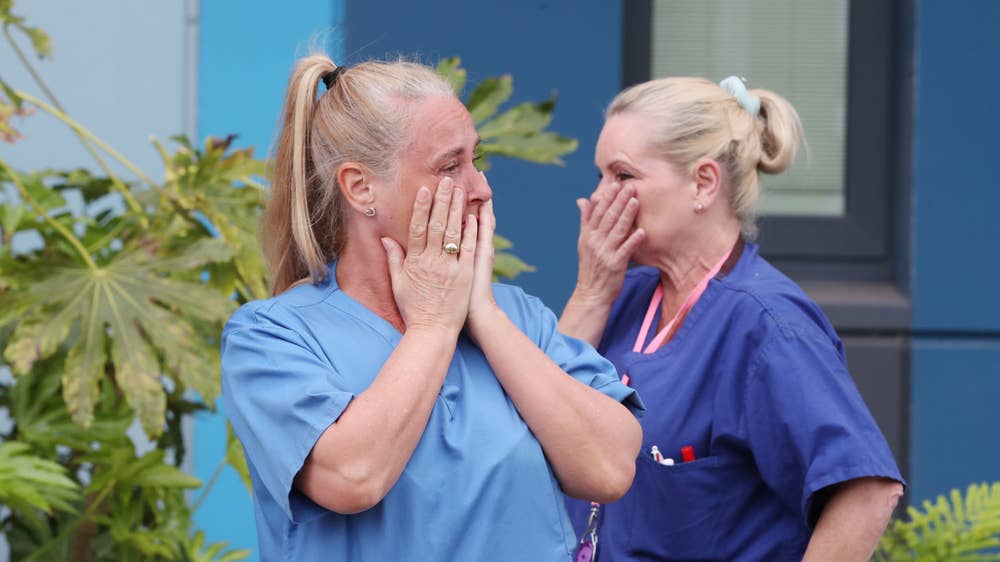
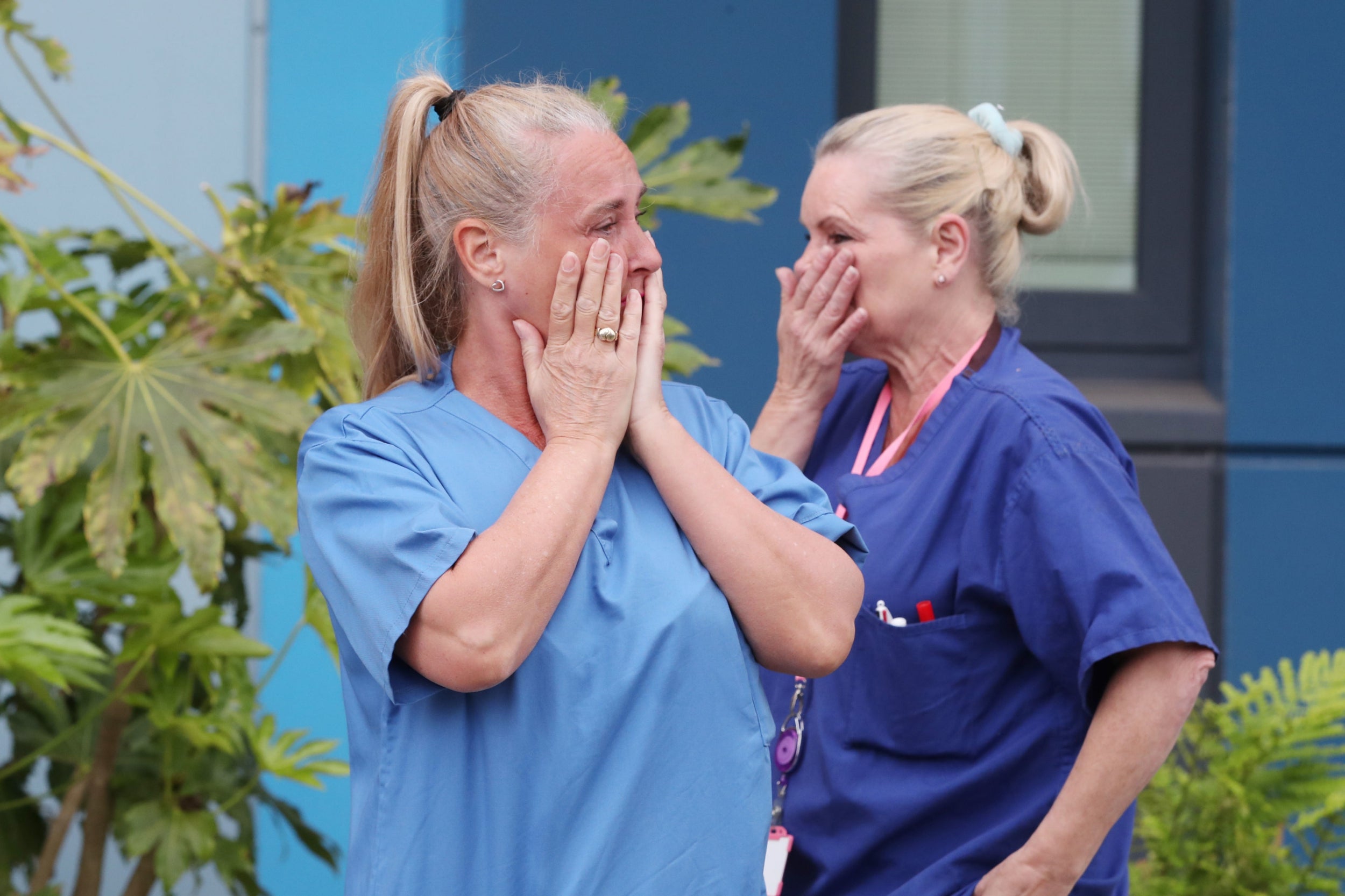
1/30
Staff react outside Salford Royal Hospital in Manchester during a minute’s silence to pay tribute to the NHS staff and key workers who have died during the coronavirus outbreak
PA
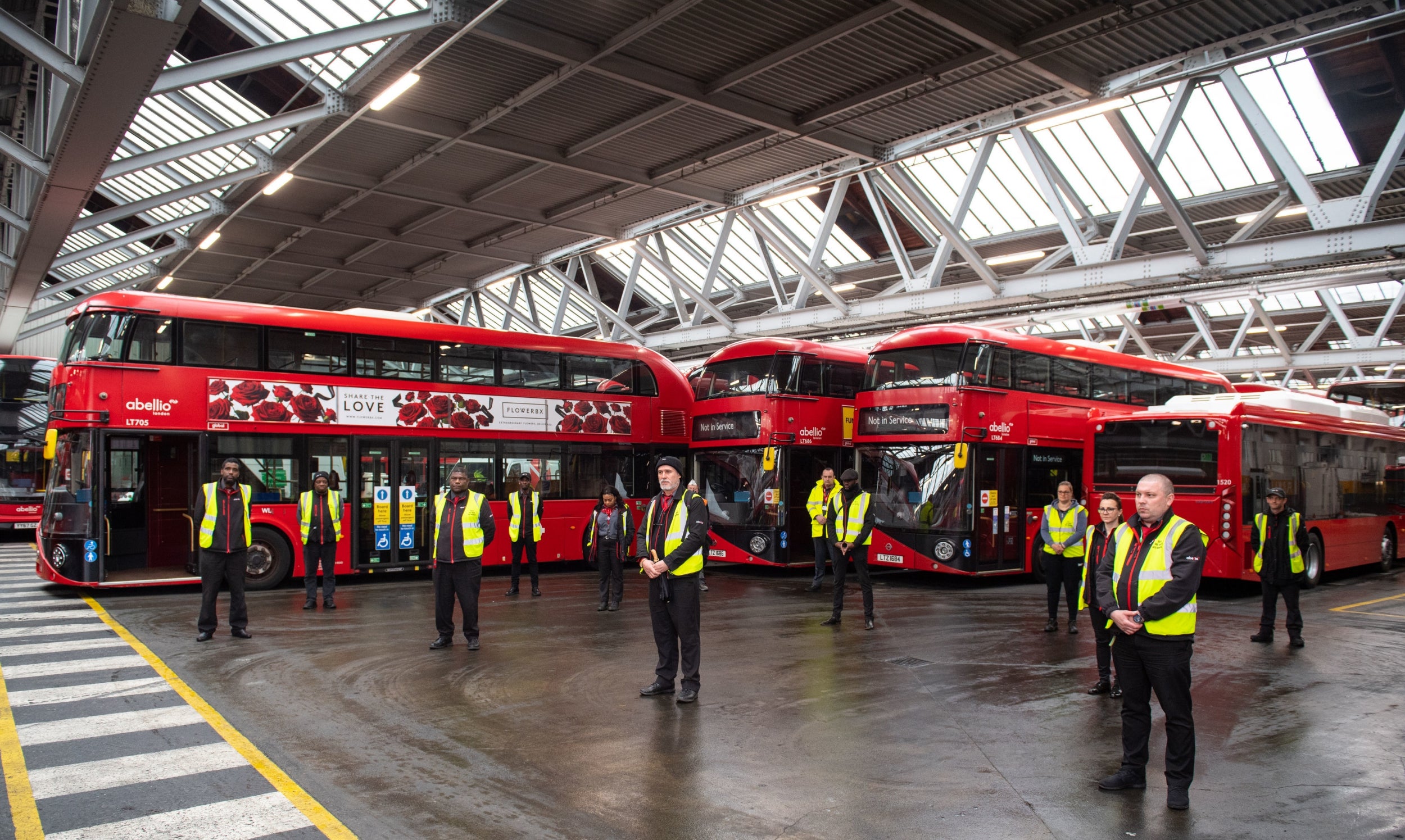
2/30
Staff inside Camberwell bus depot in London, during a minute’s silence
PA
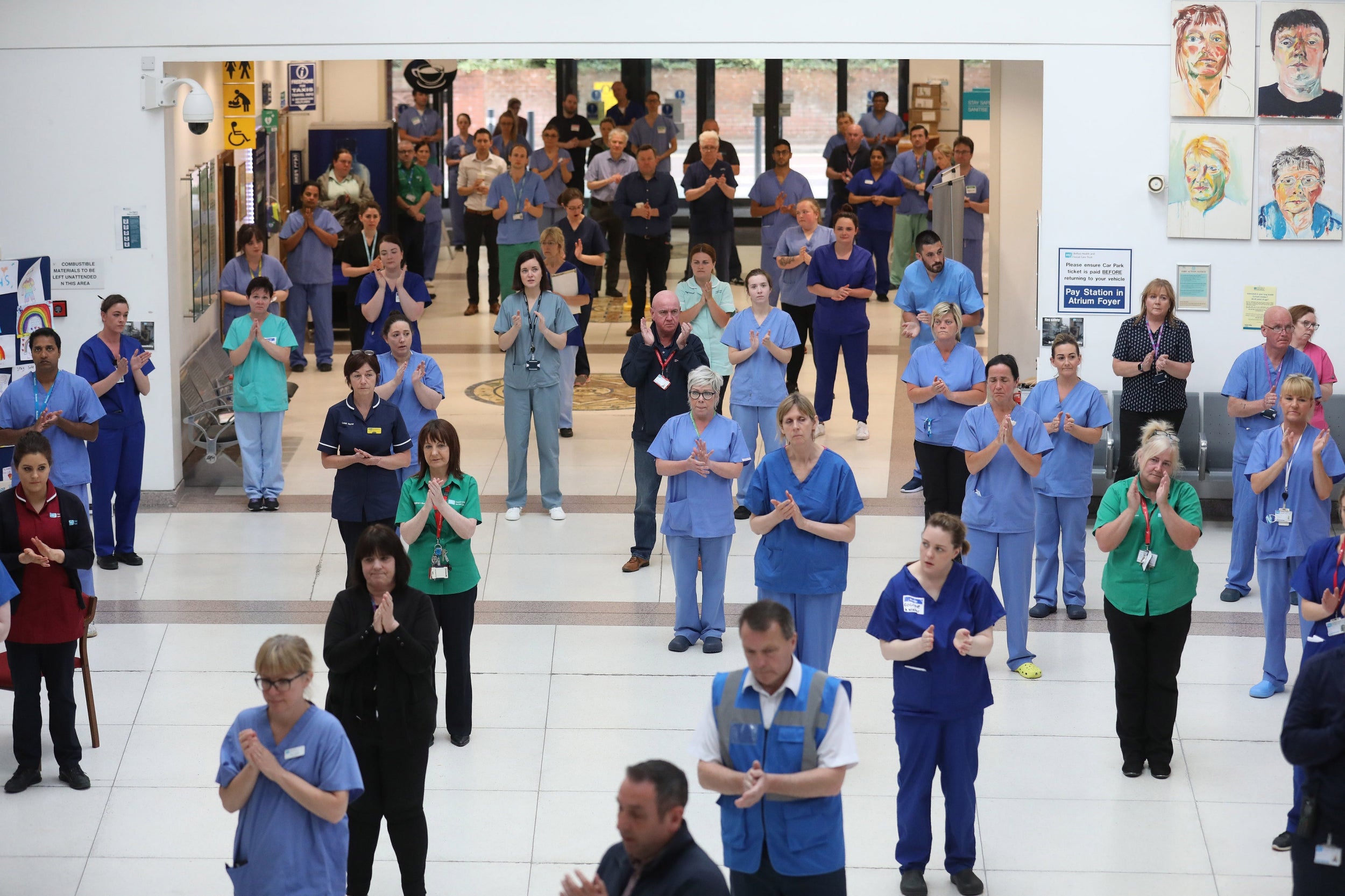
3/30
NHS staff at the Mater hospital in Belfast, during a minute’s silence to pay tribute to the NHS staff and key workers who have died during the coronavirus outbreak.
PA
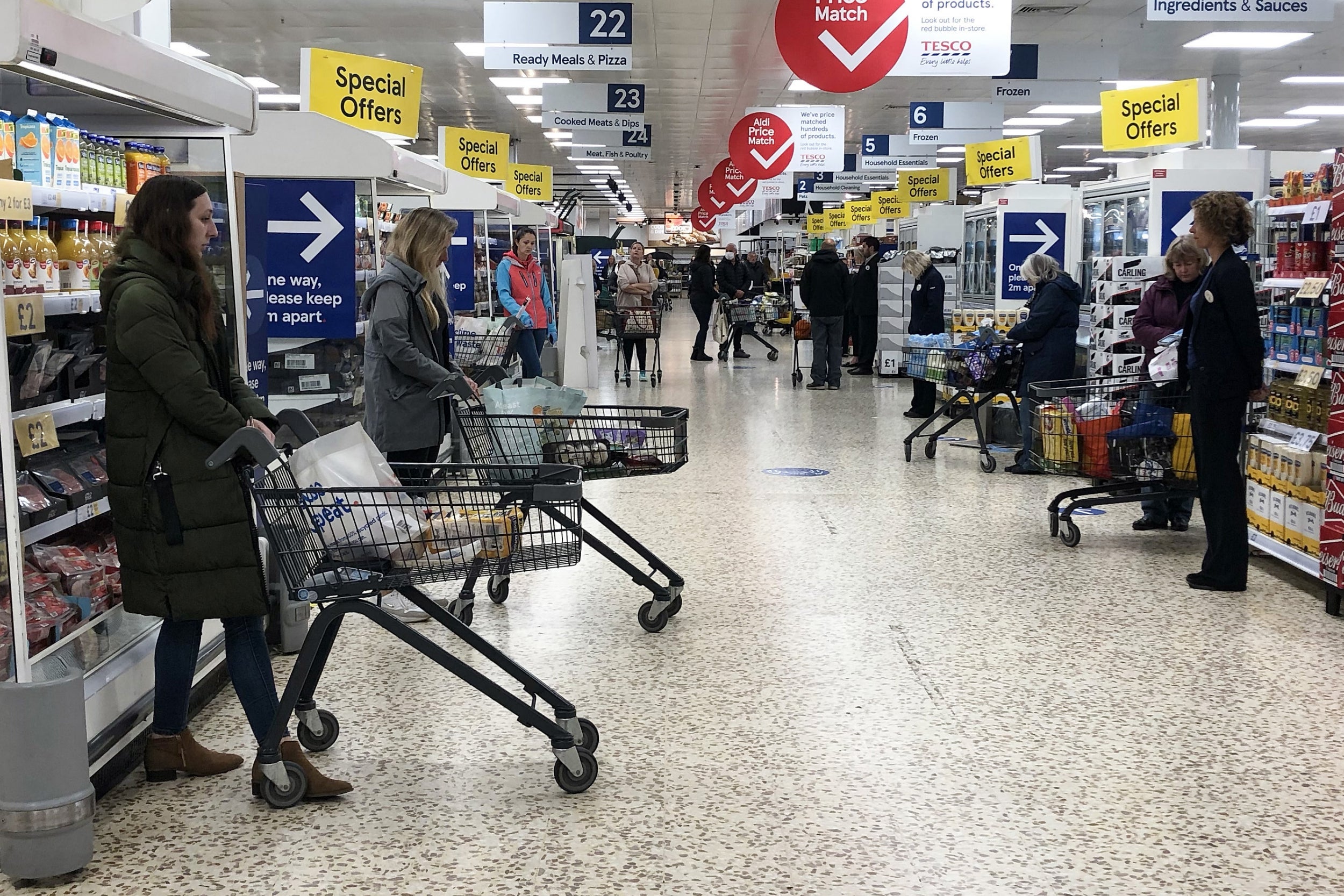
4/30
Shoppers observe a minute’s silence in Tescos in Shoreham
Getty
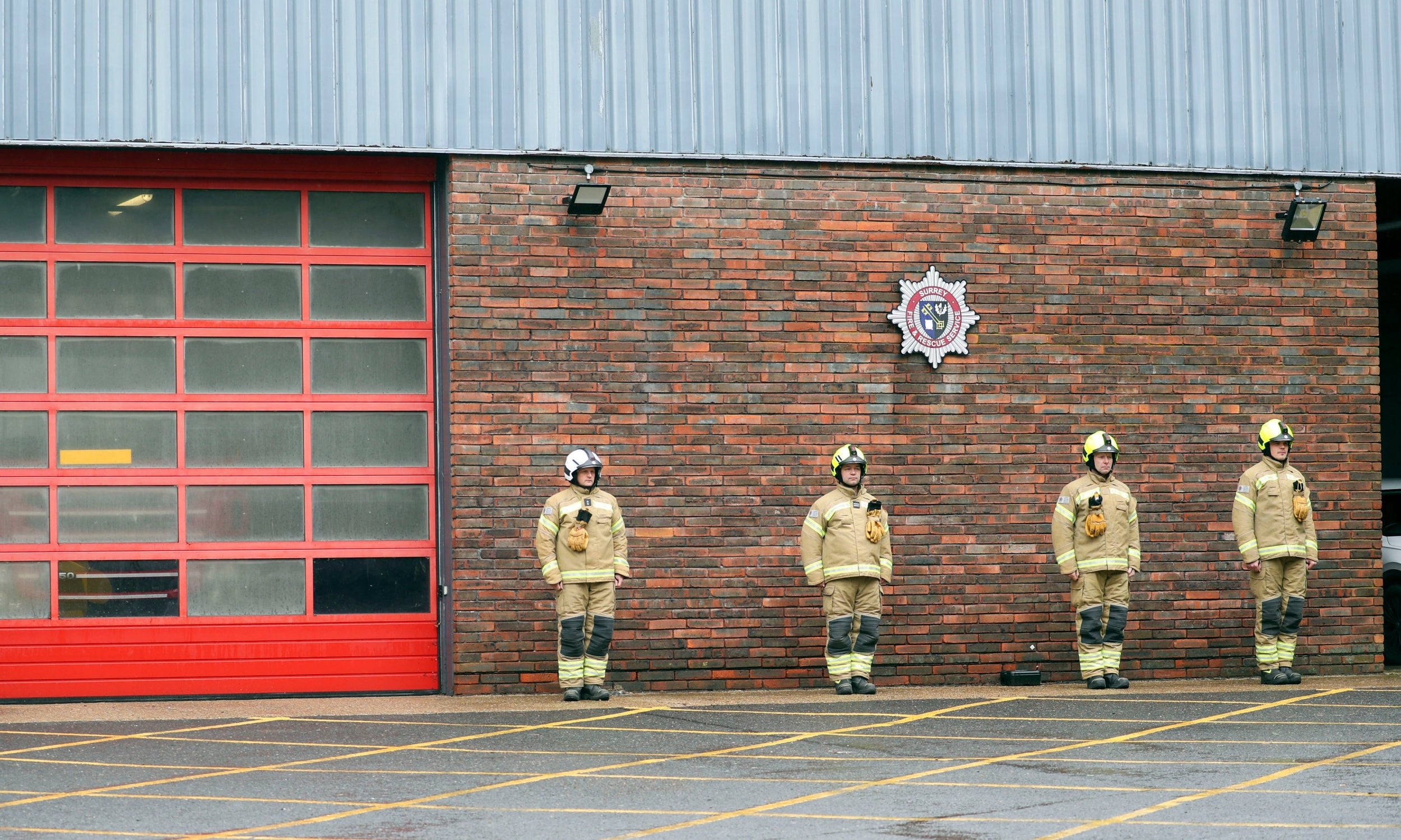
5/30
Firefighters outside Godstone fire station
PA
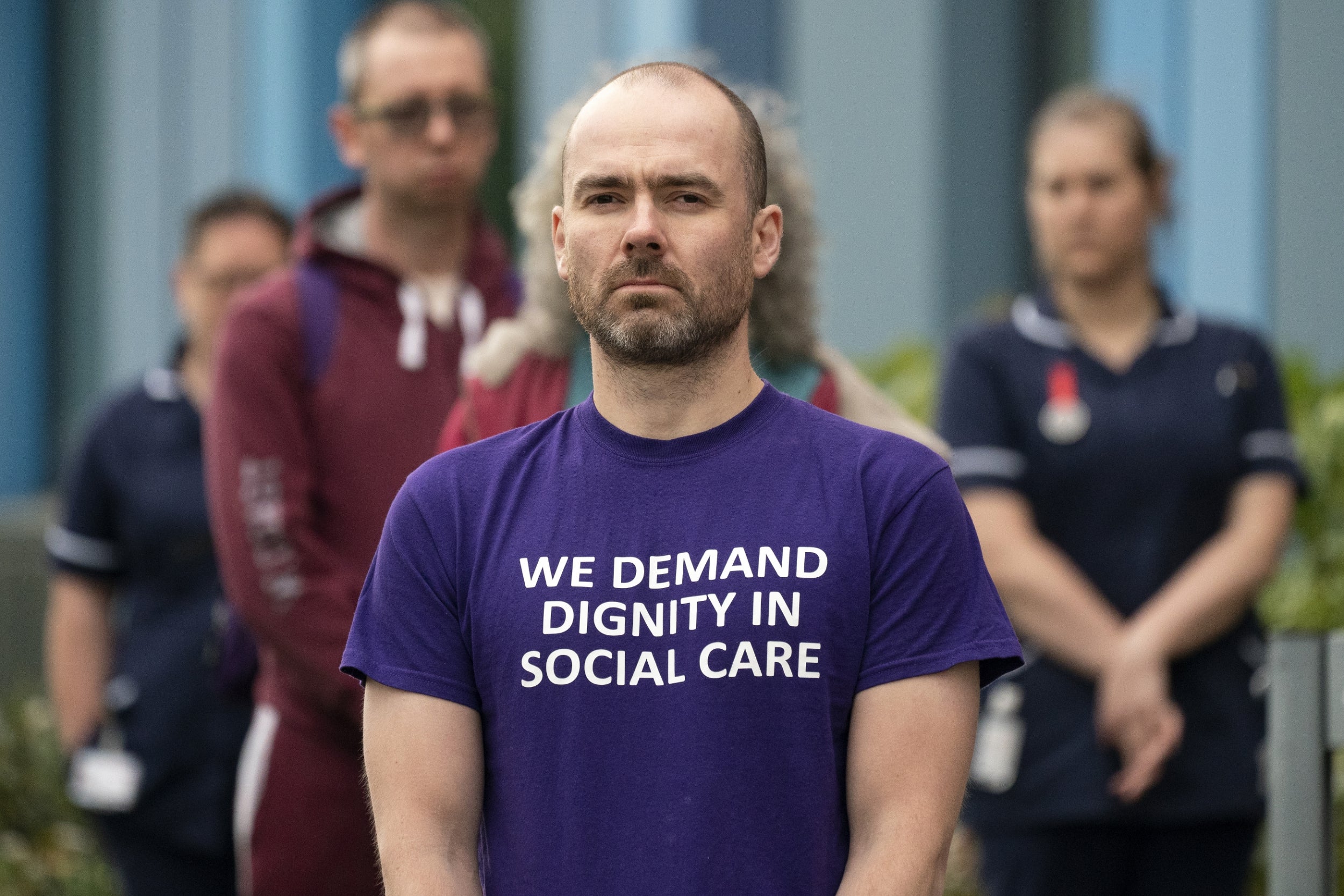
6/30 Salford Royal Hospital
Getty
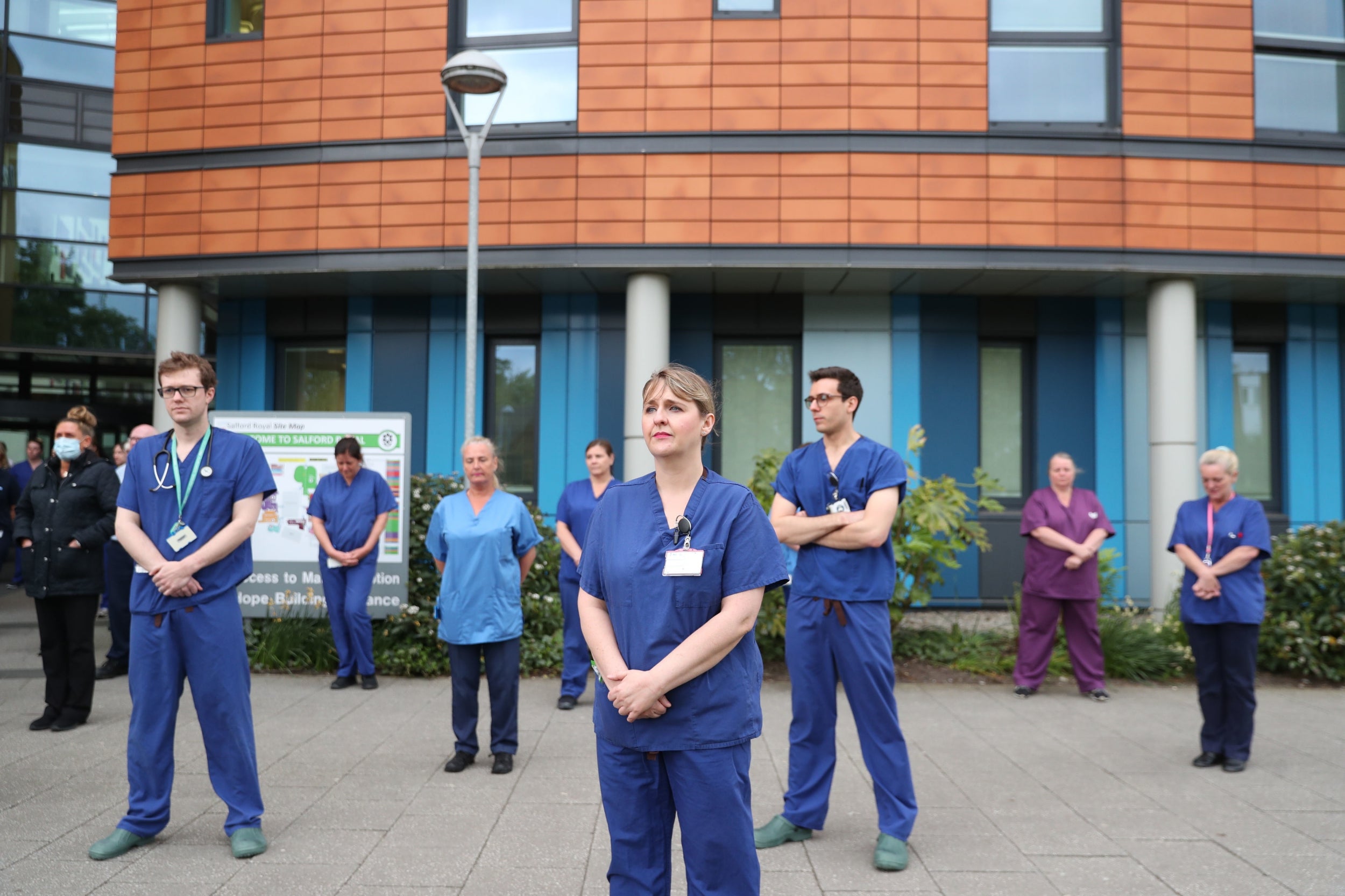
7/30 Salford Royal Hospital
PA
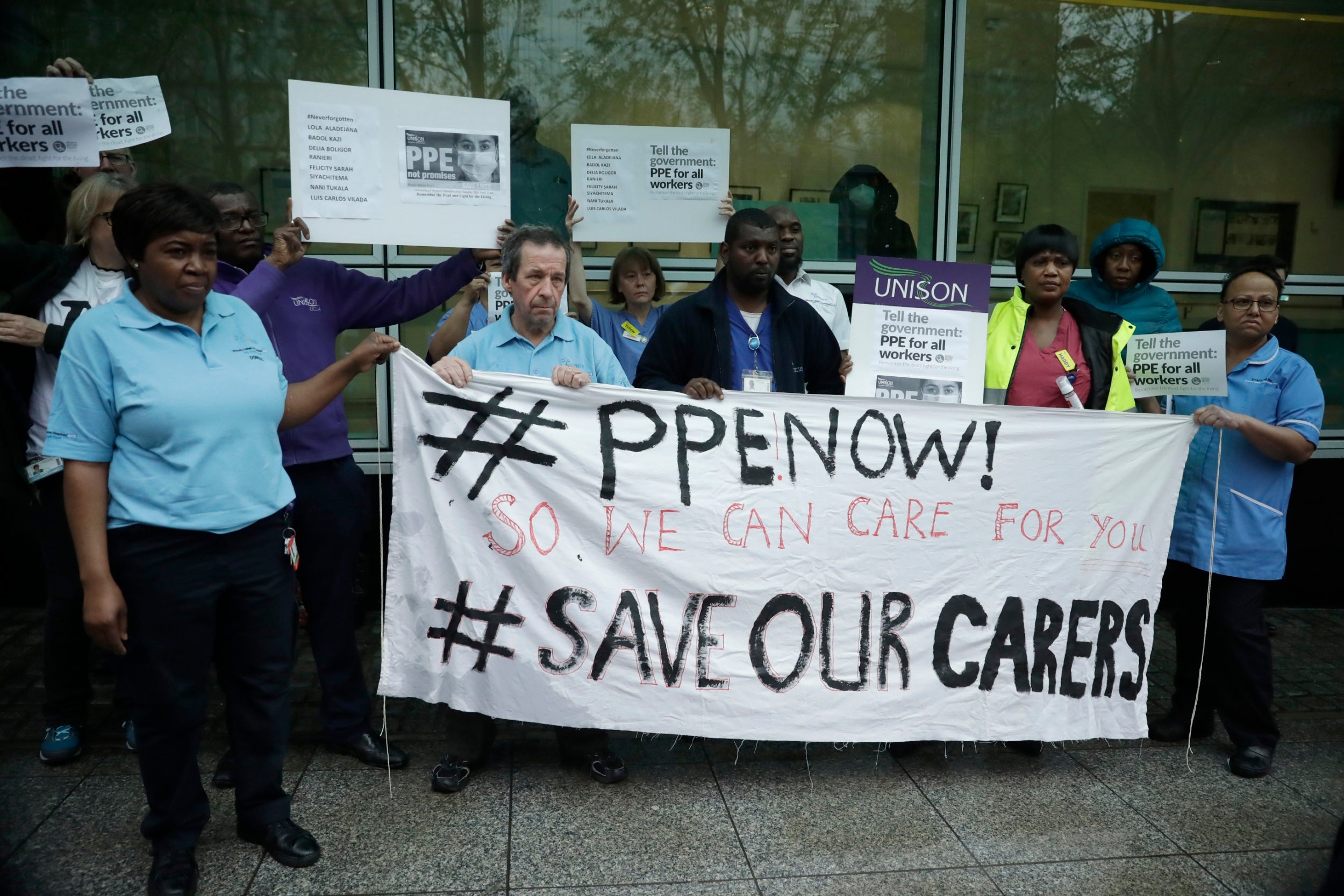
8/30
Hospital workers take part in a protest calling on the British government to provide PPE across Britain for all workers in care, the NHS and other vital public services after a nationwide minute’s silence at University College Hospital in London
AP
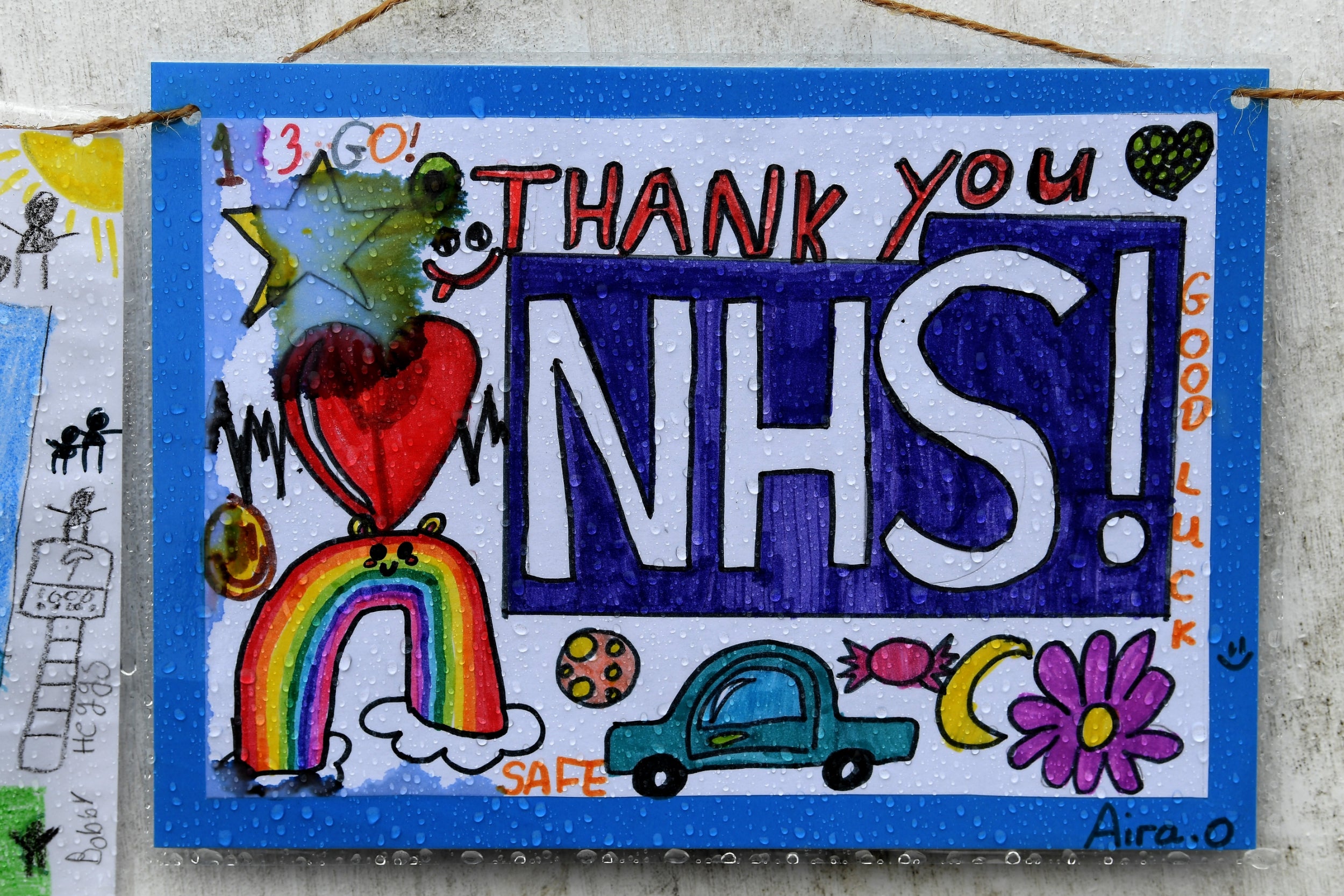
9/30
A school children’s poster hanging outside Glenfield Hospital during a minute’s silence
Getty
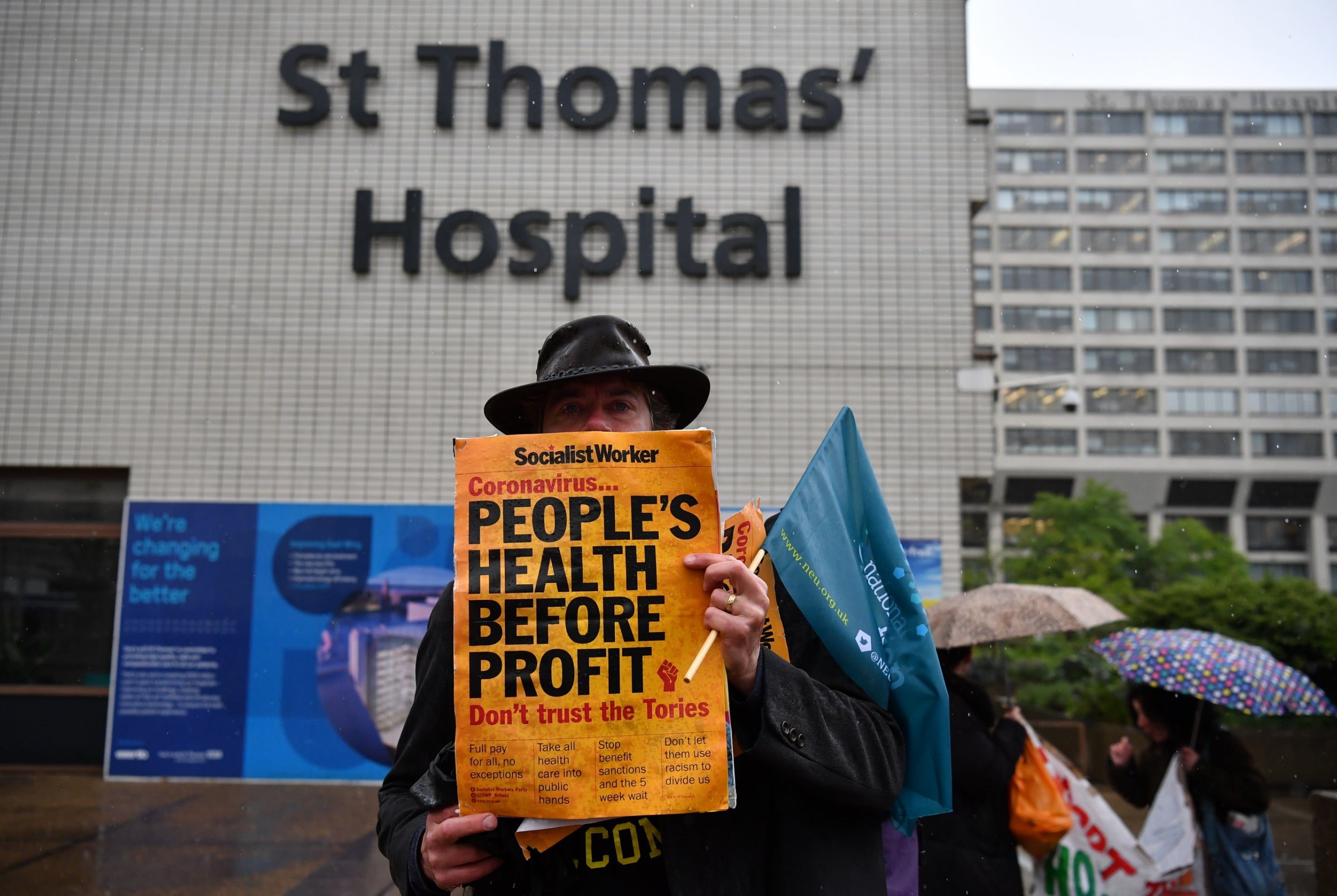
10/30
A man holds a placard that reads “People’s health before profit” outside St Thomas hospital
Getty
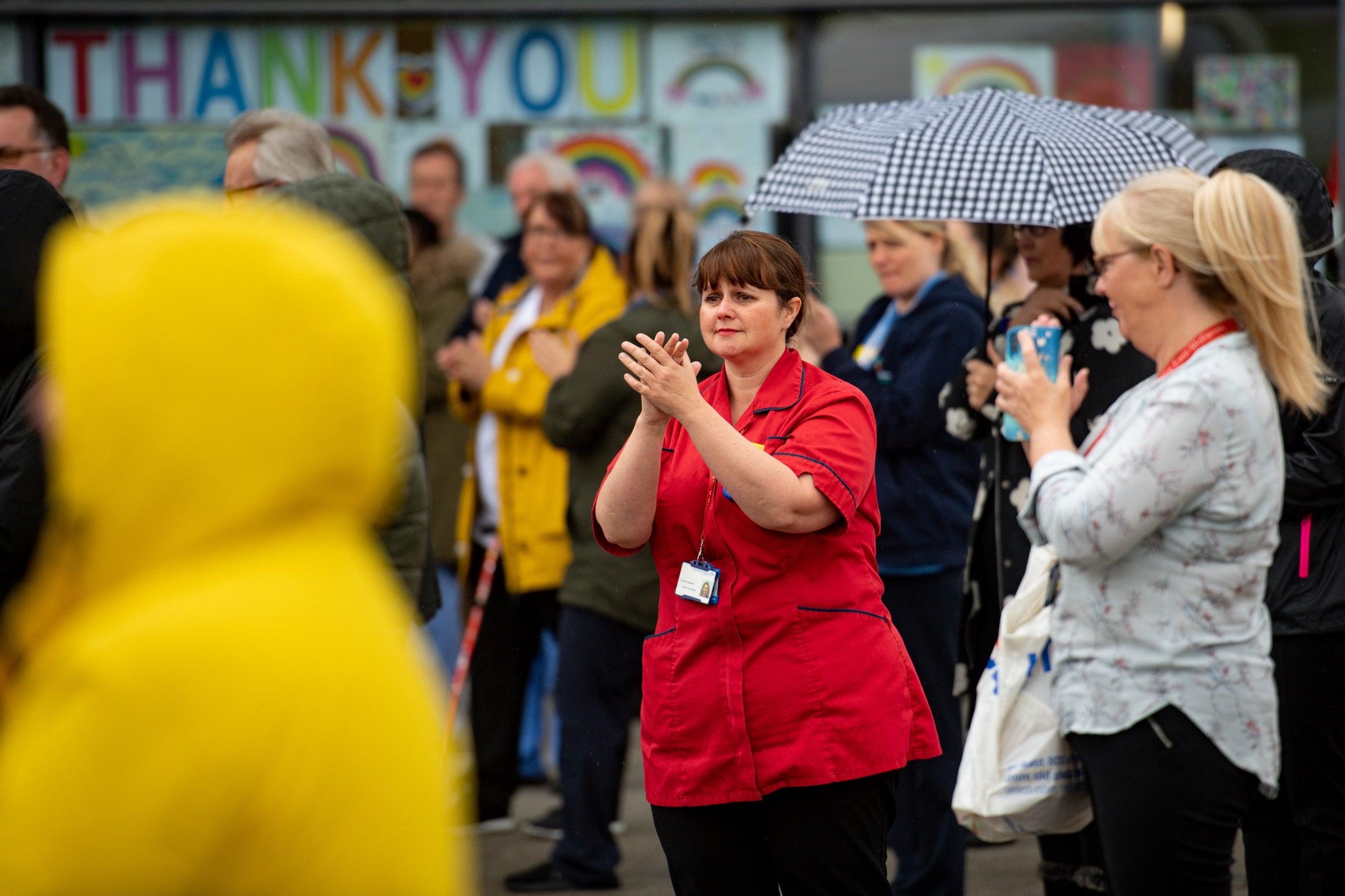
11/30
Staff members applaud outside the Royal Derby Hospital, following a minute’s silence
PA
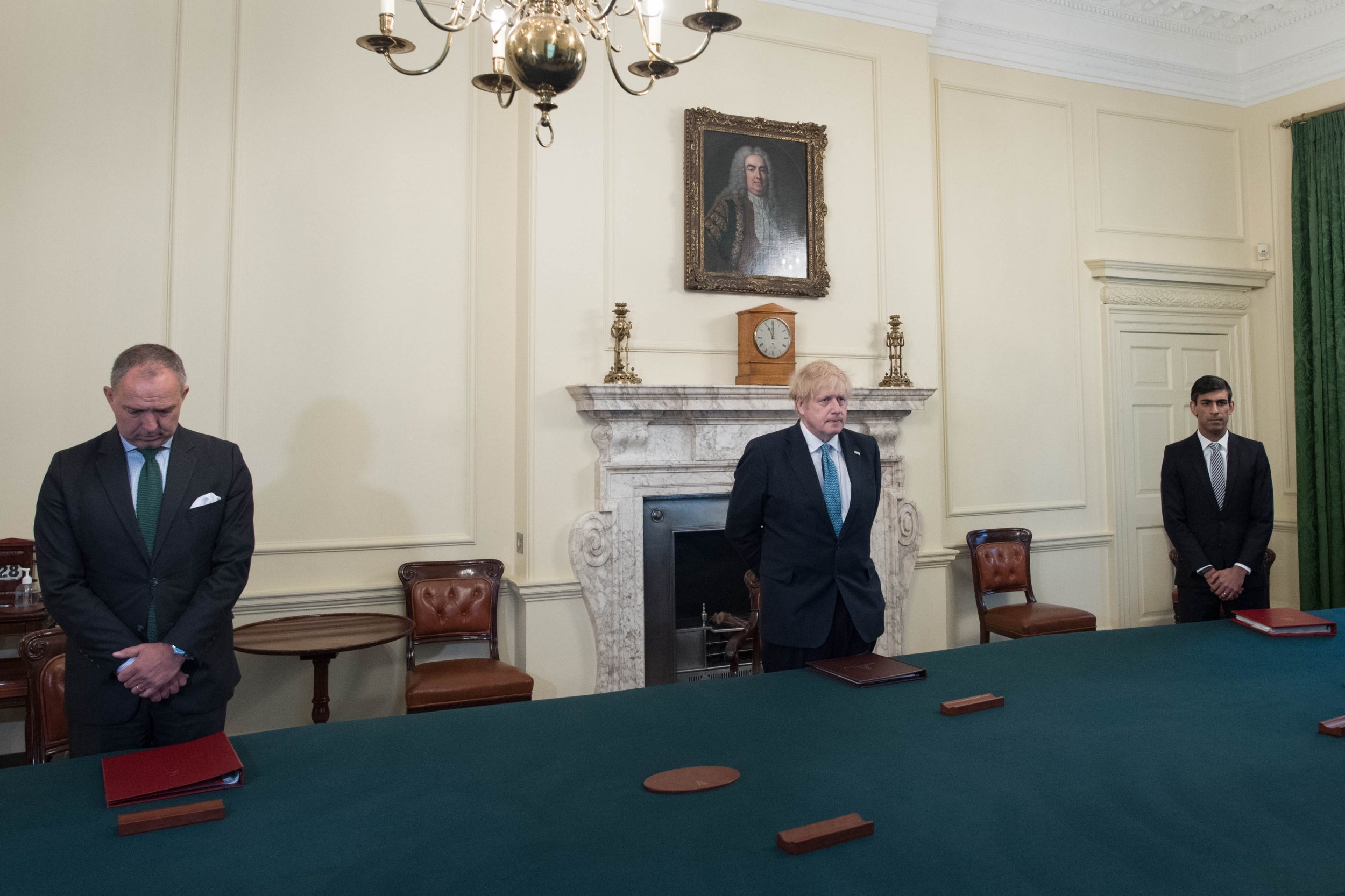
12/30
Cabinet Secretary Mark Sedwill, Prime minister Boris Johnson and Chancellor of the Exchequer Rishi Sunak, stand inside 10 Downing Street, London, to observe a minutes silence in tribute to the NHS staff and key workers who have died during the coronavirus outbreak
PA
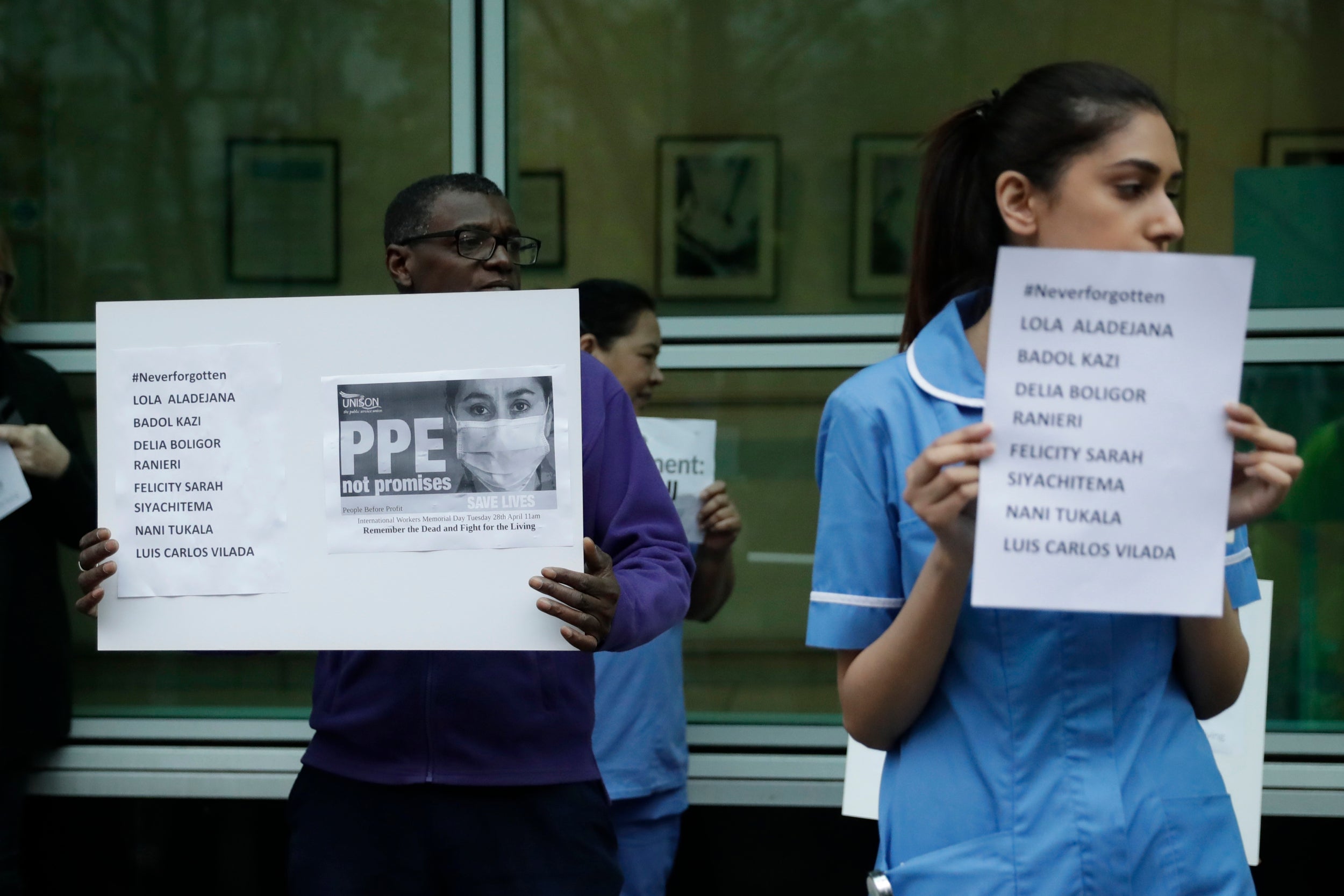
13/30 University College Hospital, London
Hospital workers hold placards with the names of their colleagues who have died from coronavirus as they take part in a protest calling on the British government to provide PPE
AP
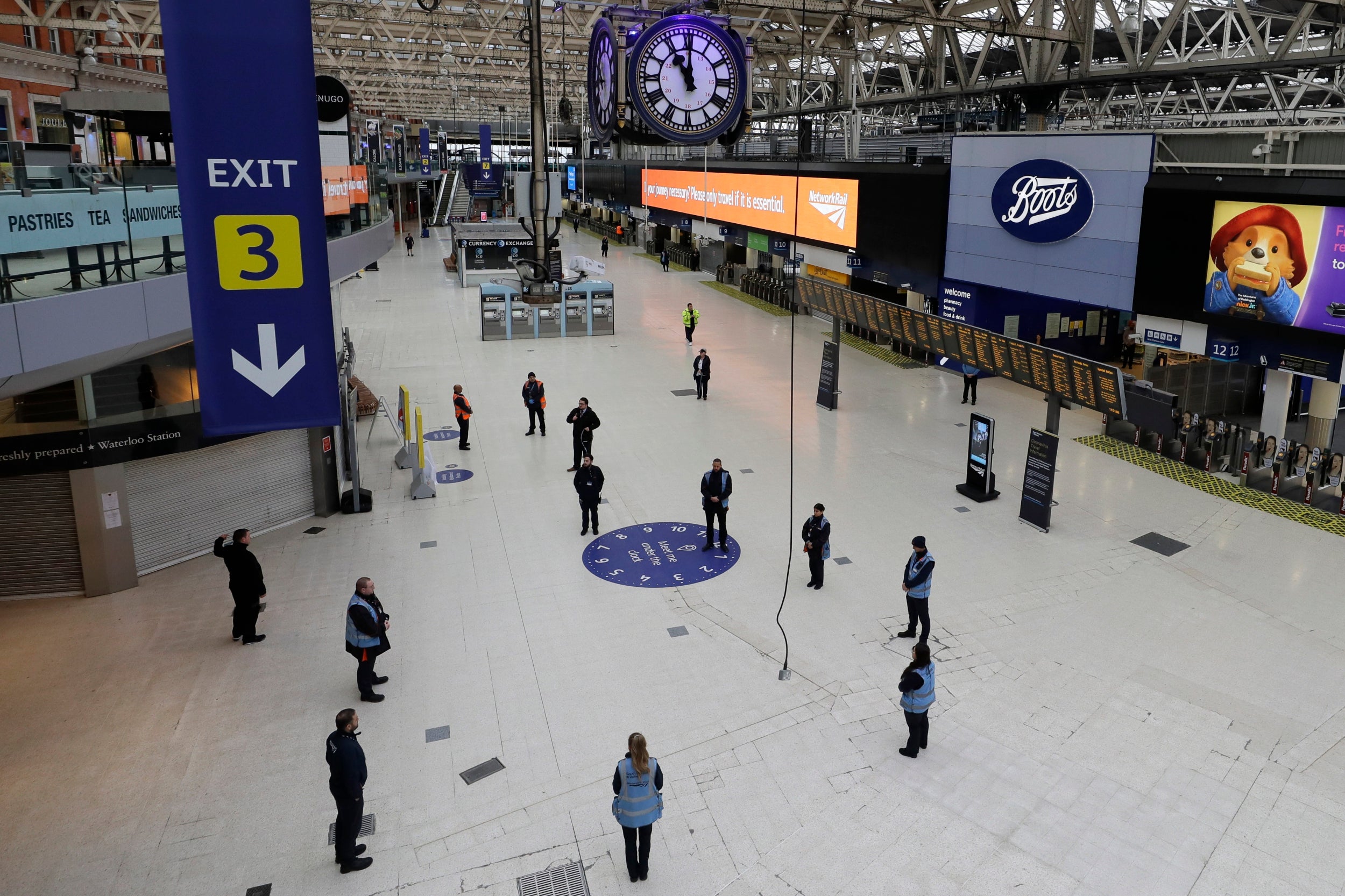
14/30
Staff at Waterloo Station in London, stand to observe a minute’s silence, to pay tribute to NHS and key workers who have died with coronavirus
AP
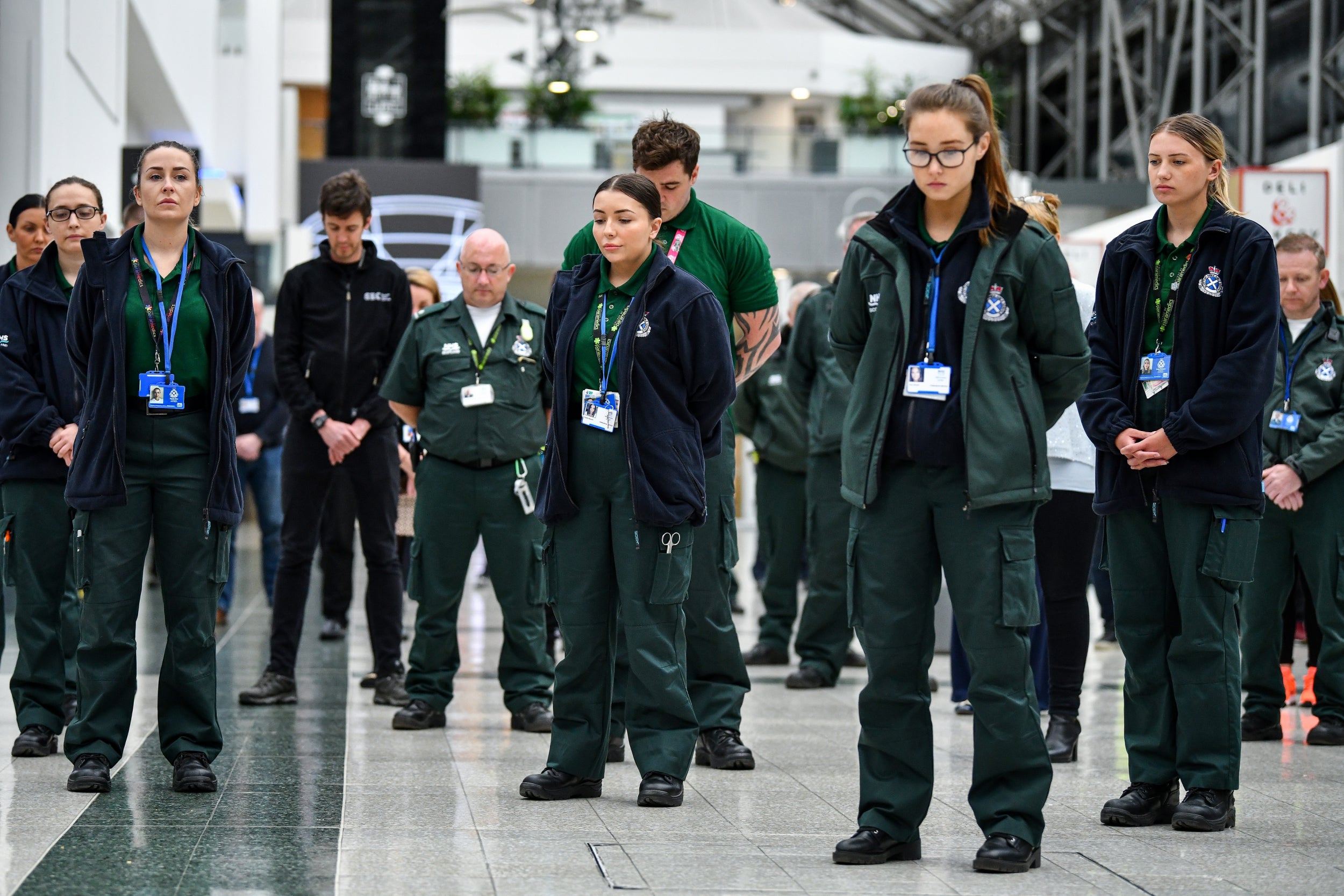
15/30
Medical staff at the Louisa Jordan hospital stand during a UK wide minutes silence to commemorate the key workers who have died with coronavirus in Glasgow
Getty
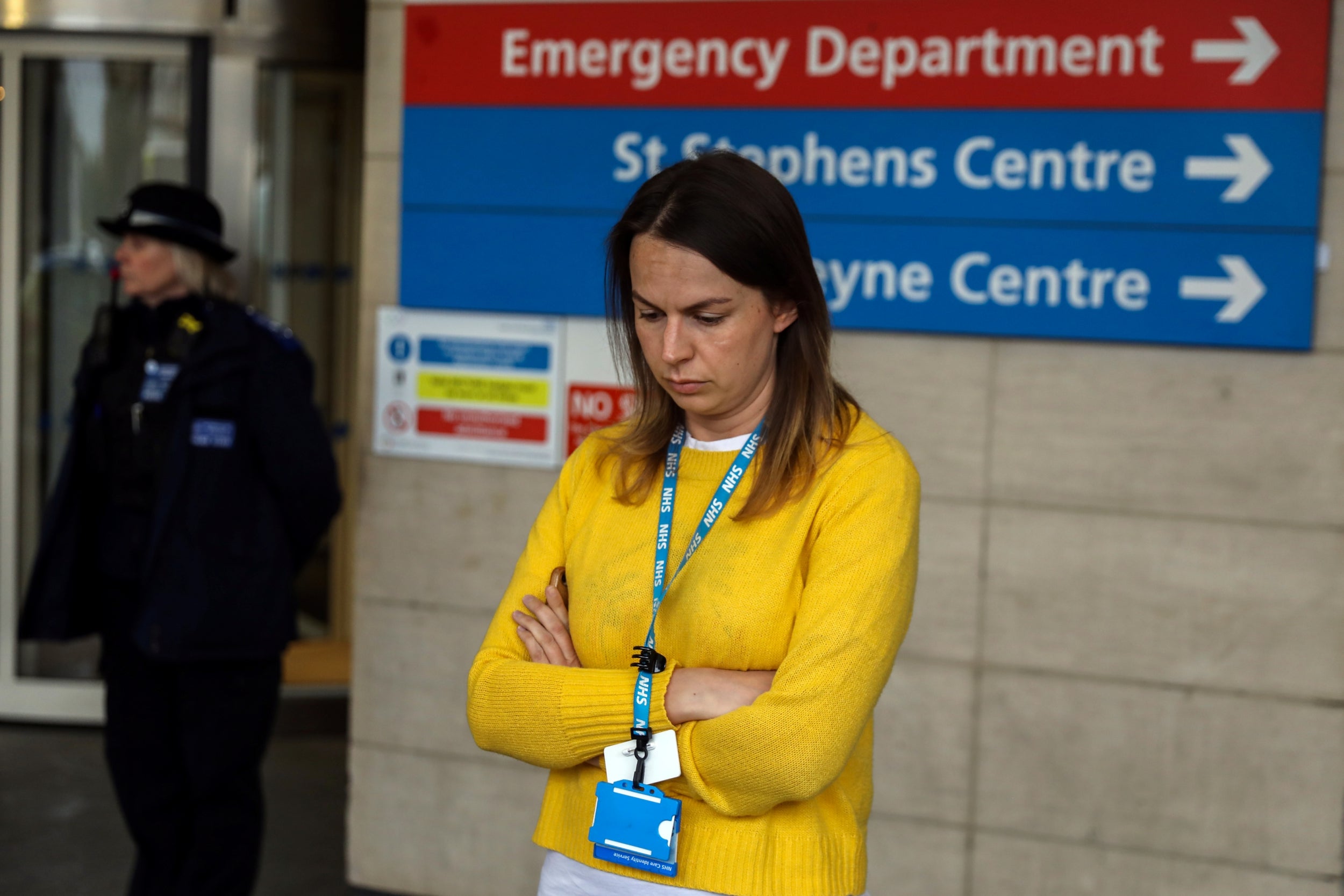
16/30 London
An NHS worker observes a minute’s silence at Chelsea and Westminster Hospital
Reuters
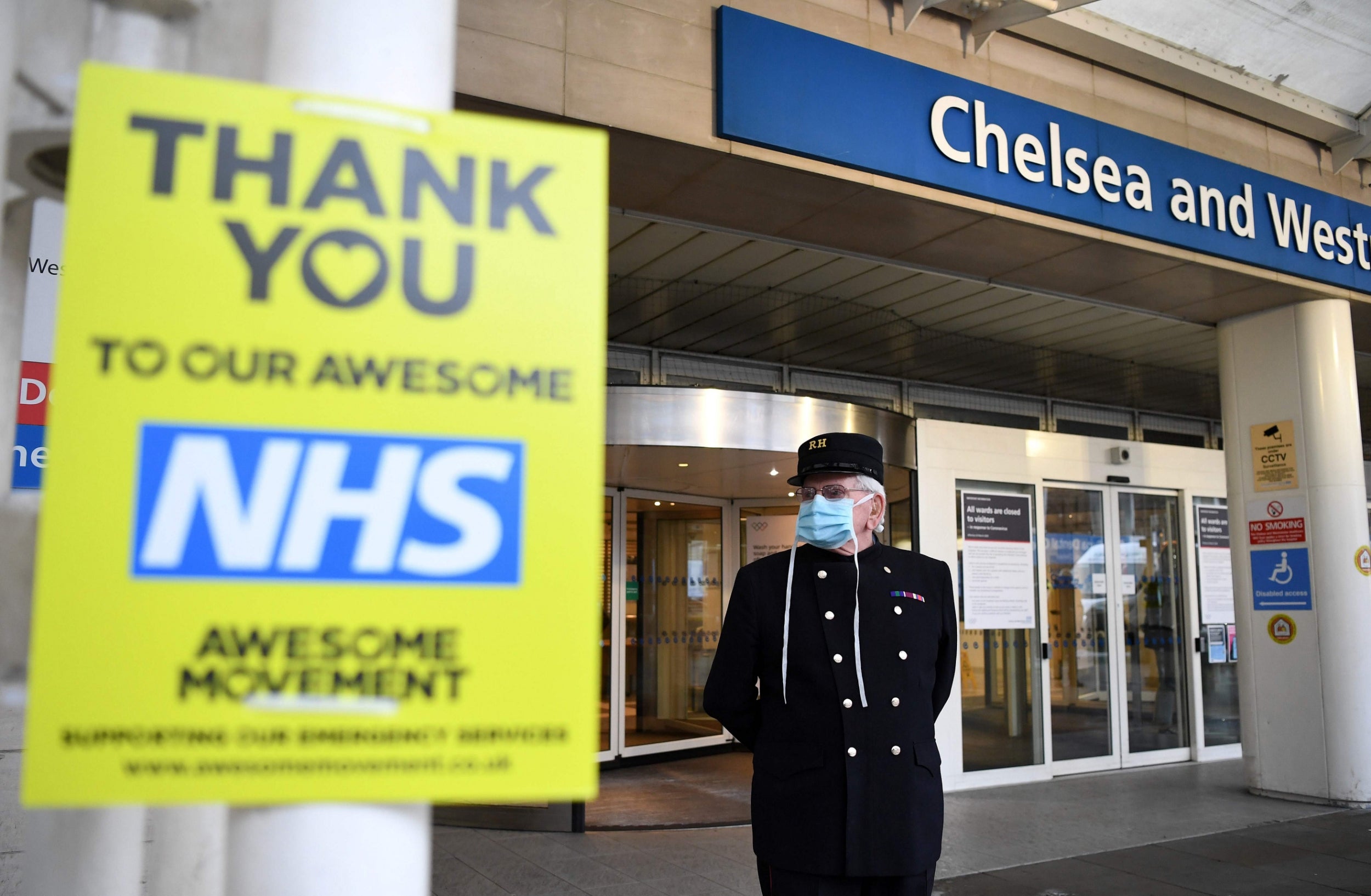
17/30 Chelsea and Westminster Hospital in London
AFP via Getty
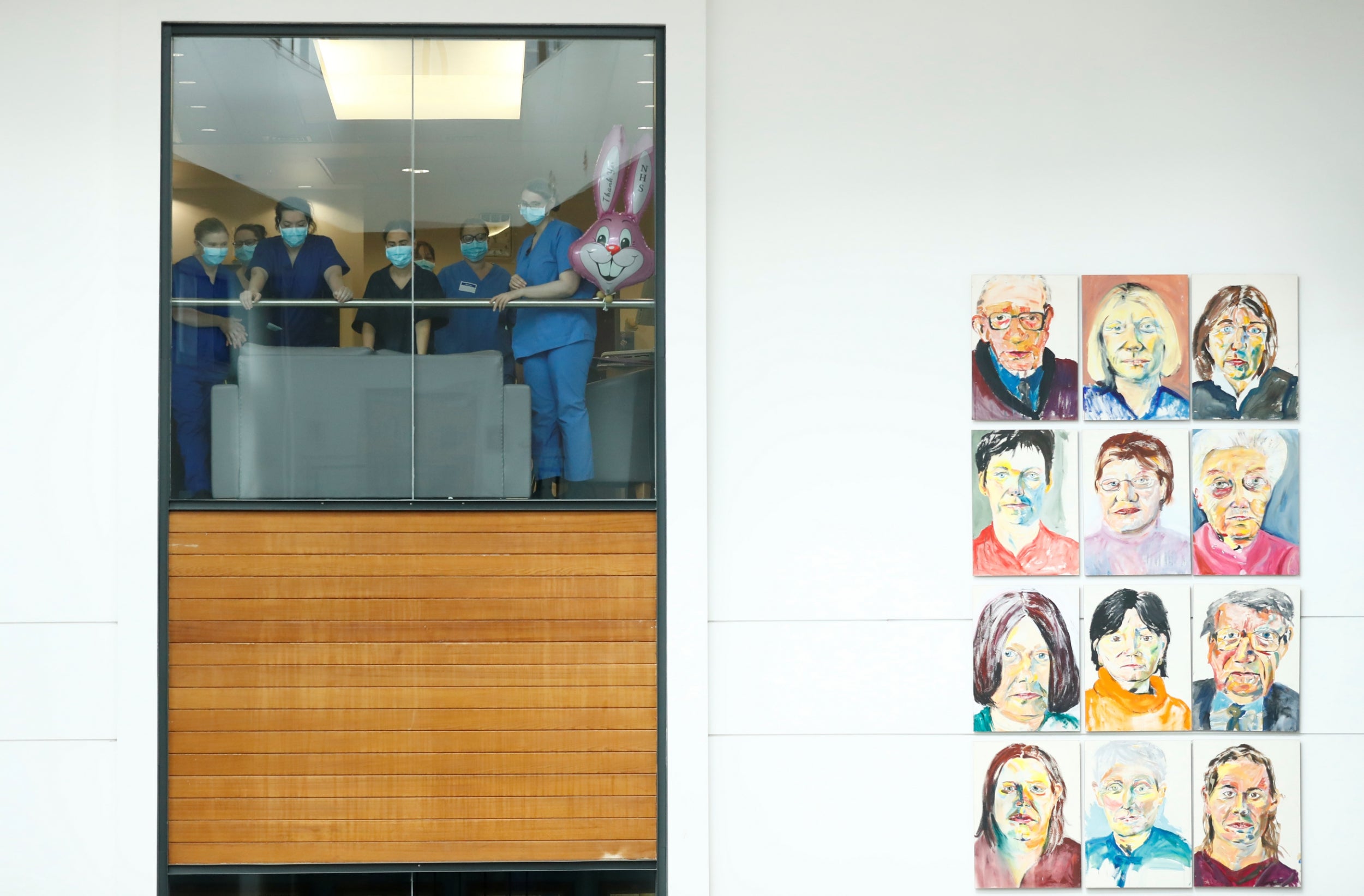
18/30 Belfast, Northern Ireland
NHS staff observe a minutes silence at Mater Infirmorum Hospital
Reuters
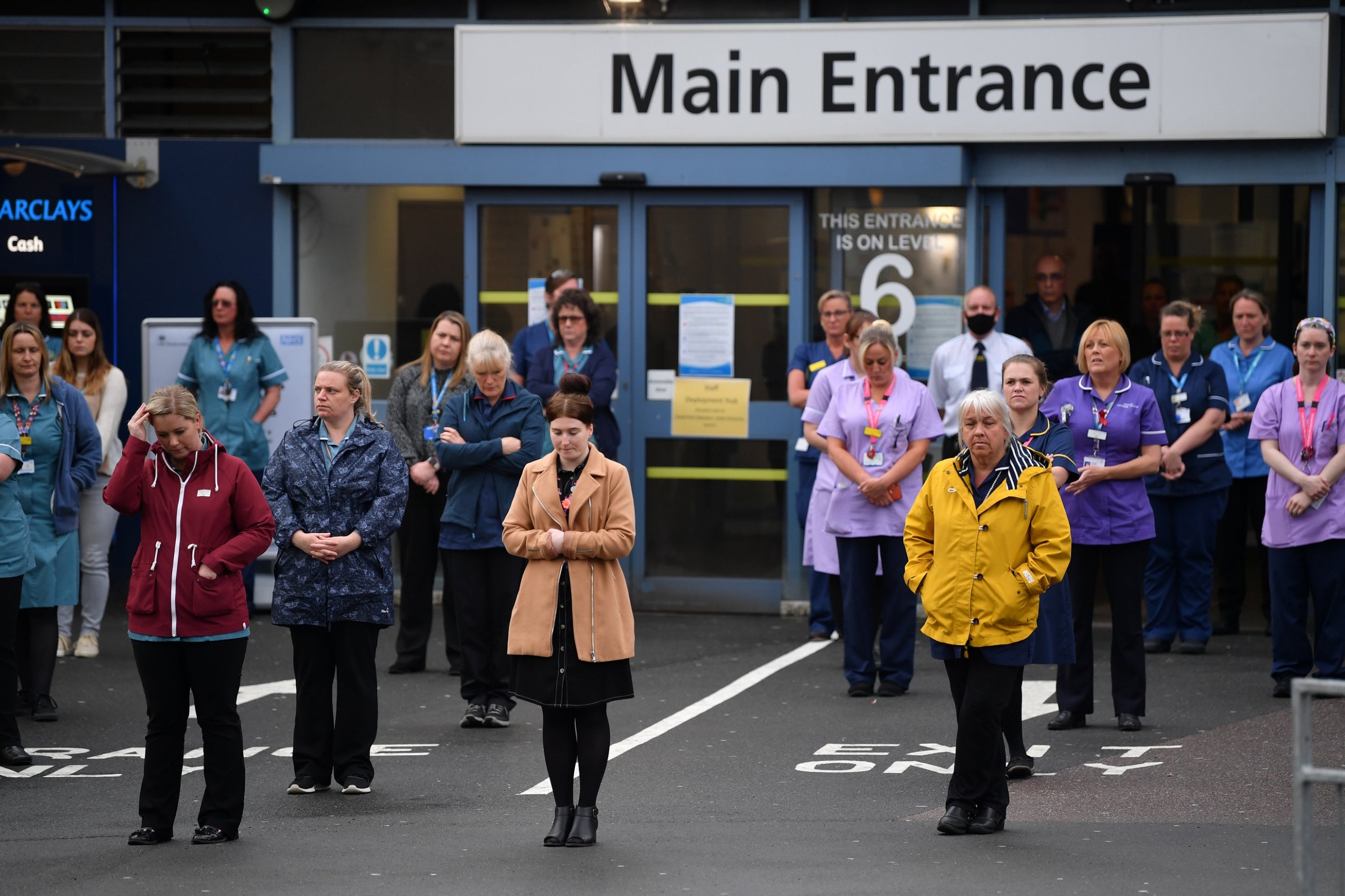
19/30 Plymouth
NHS workers hold a minute’s silence outside the main entrance of Derriford Hospital
Getty
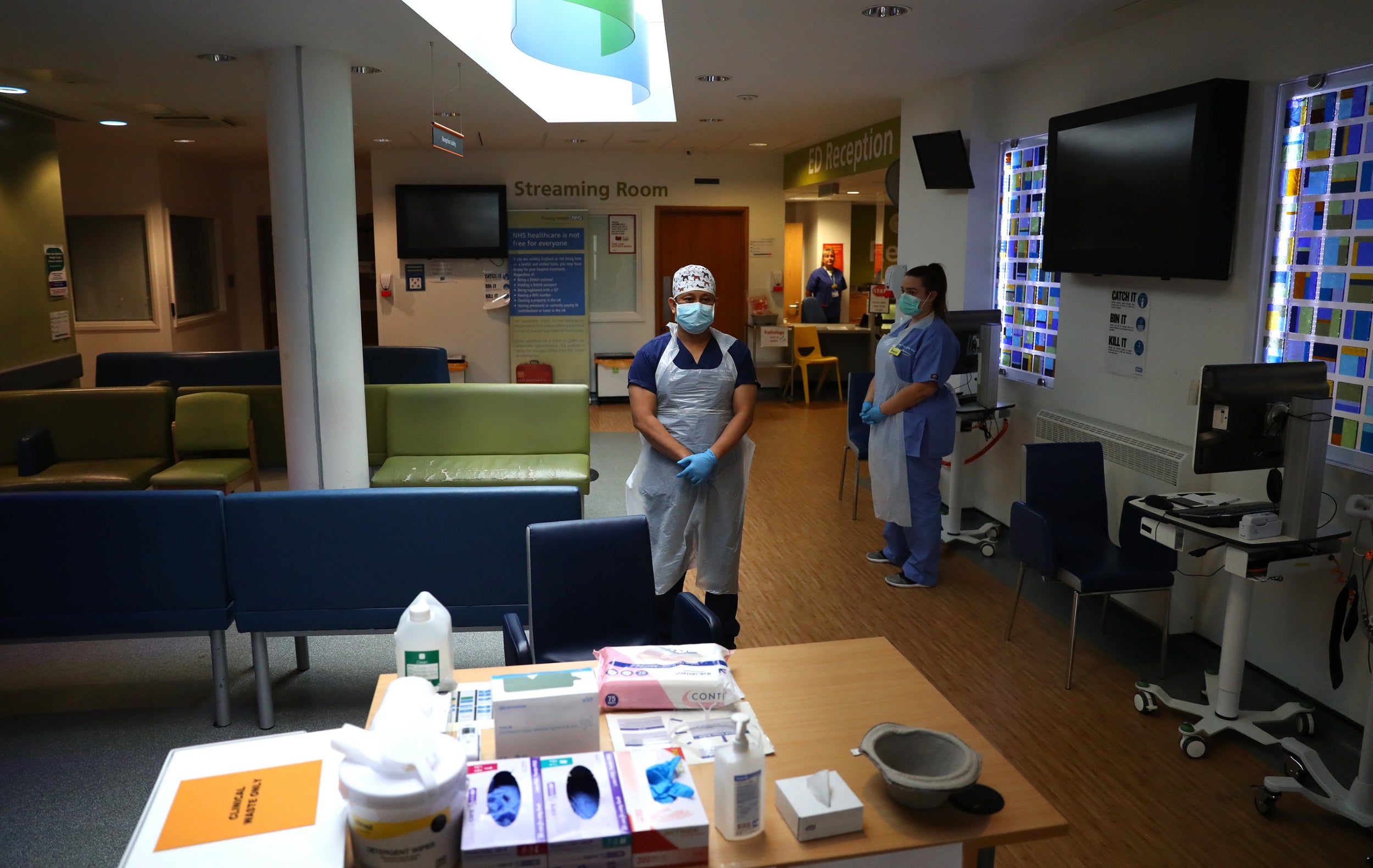
20/30
NHS Frimley Park Hospital staff at the A&E department observe a minute’s silence
Getty
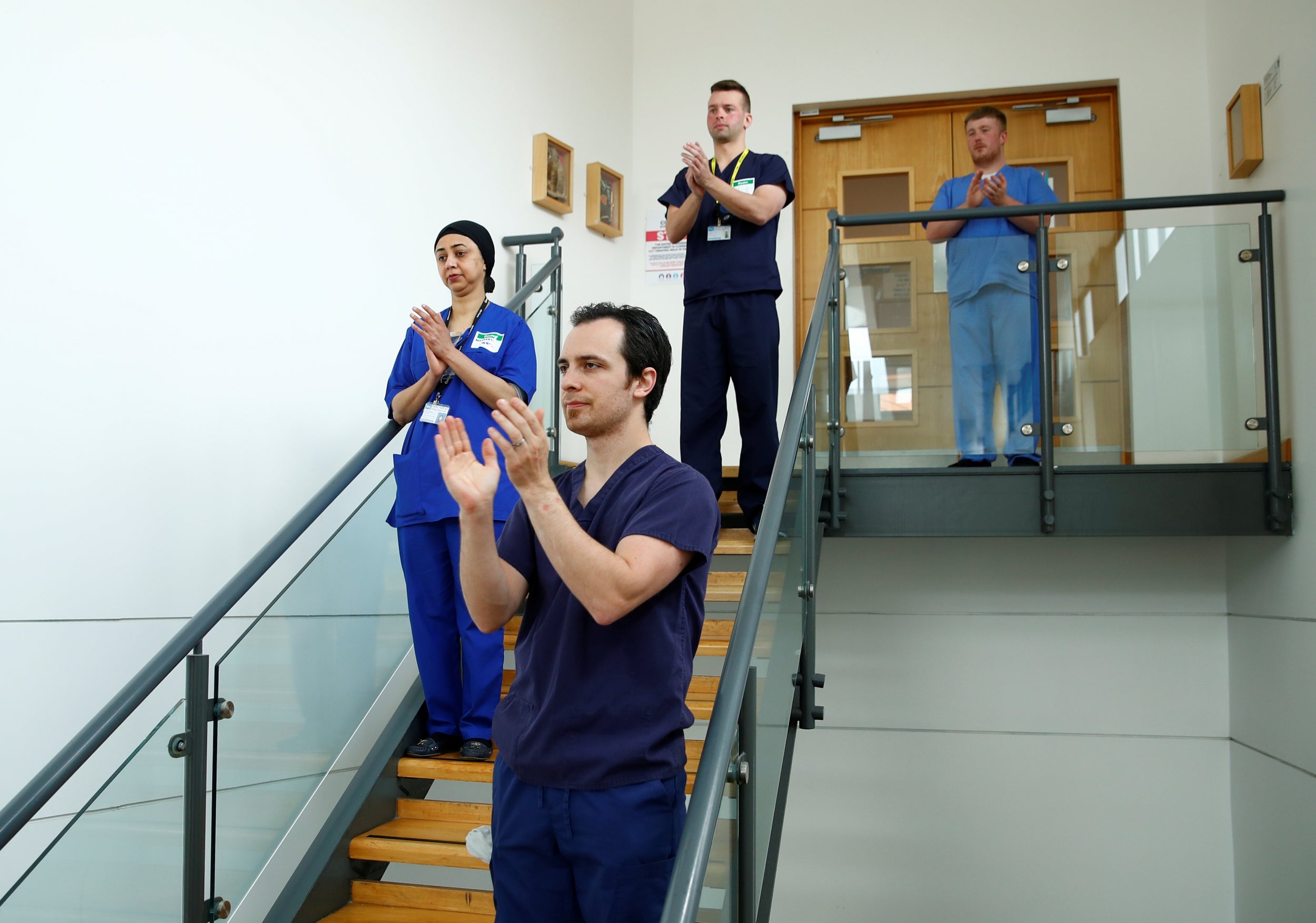
21/30 Mater Infirmorum Hospital
People applaud after a minutes silence in honour of key workers
Reuters
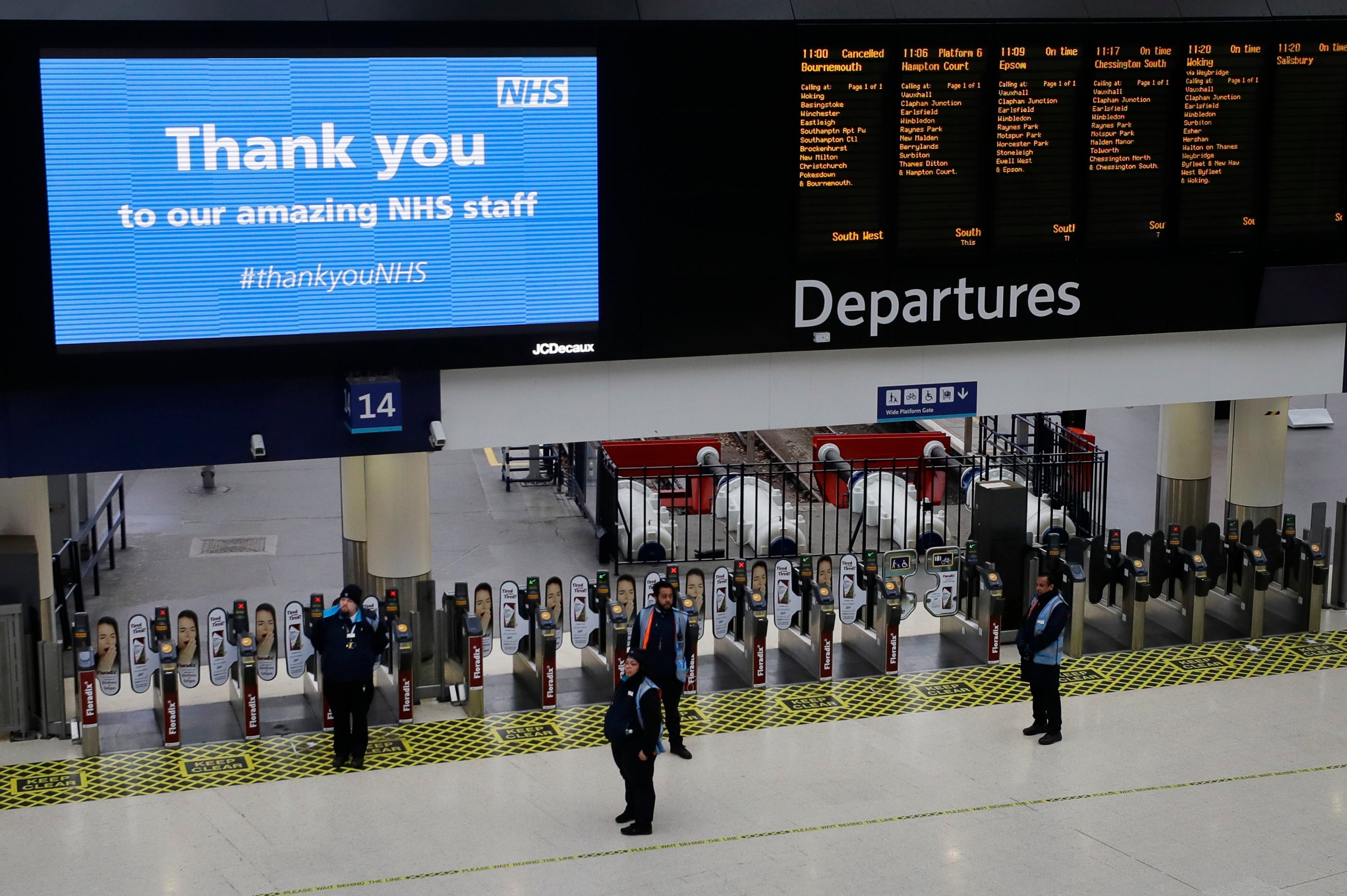
22/30 Waterloo Station, London
AP
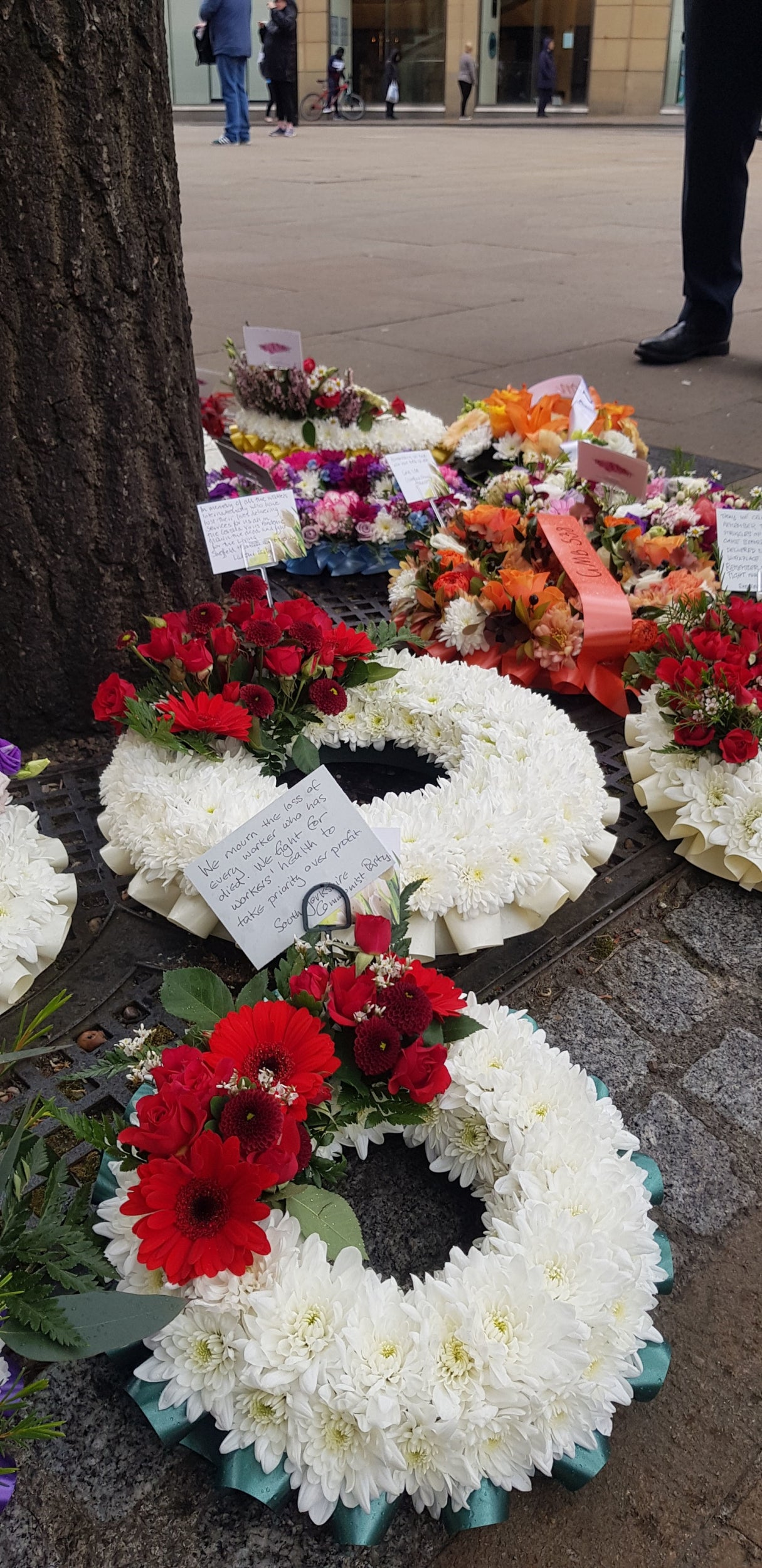
23/30
Wreaths laid outside Sheffield town hall
PA
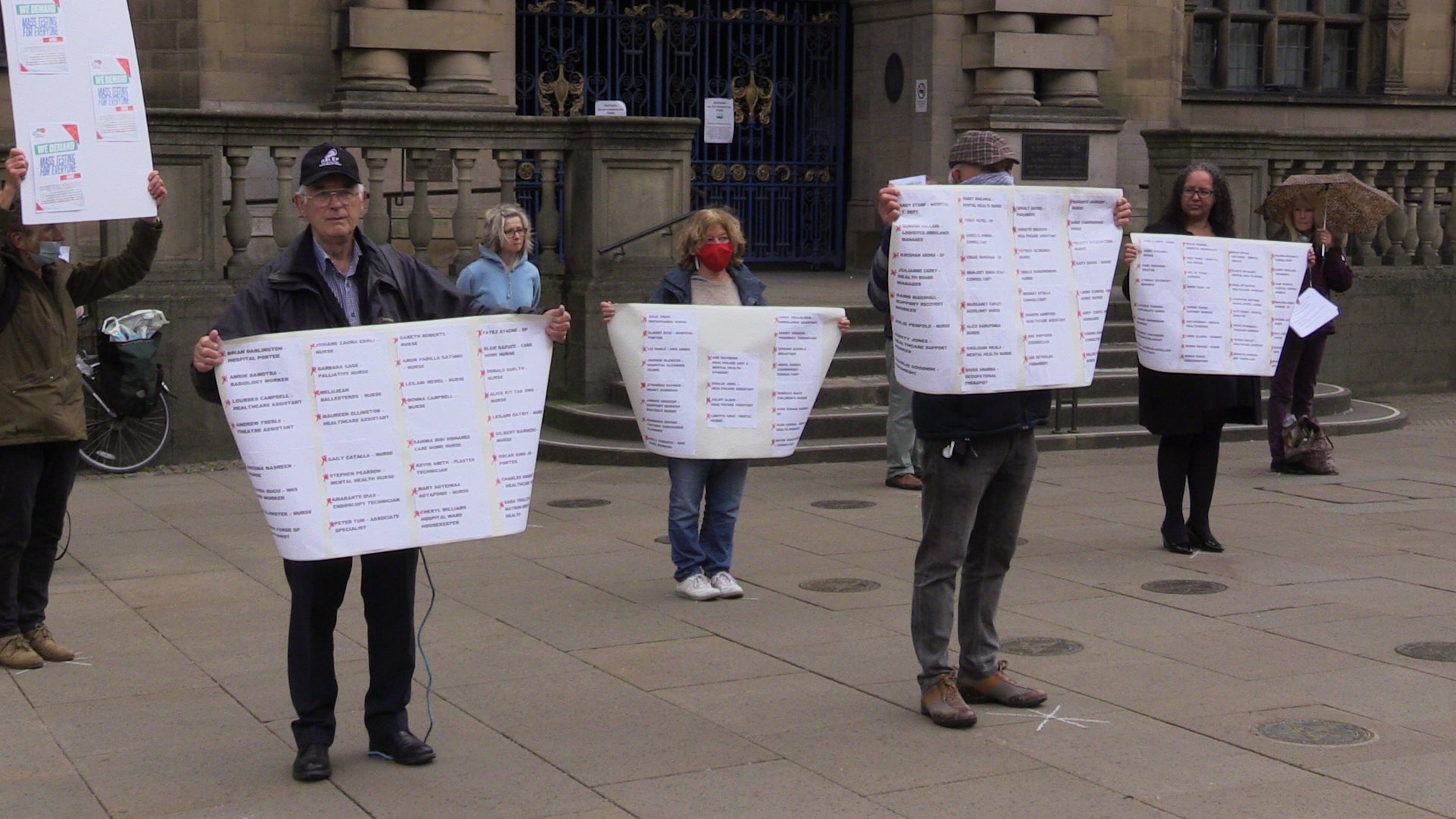
24/30
A group of trade unionists and supporters standing outside Sheffield town hall
PA
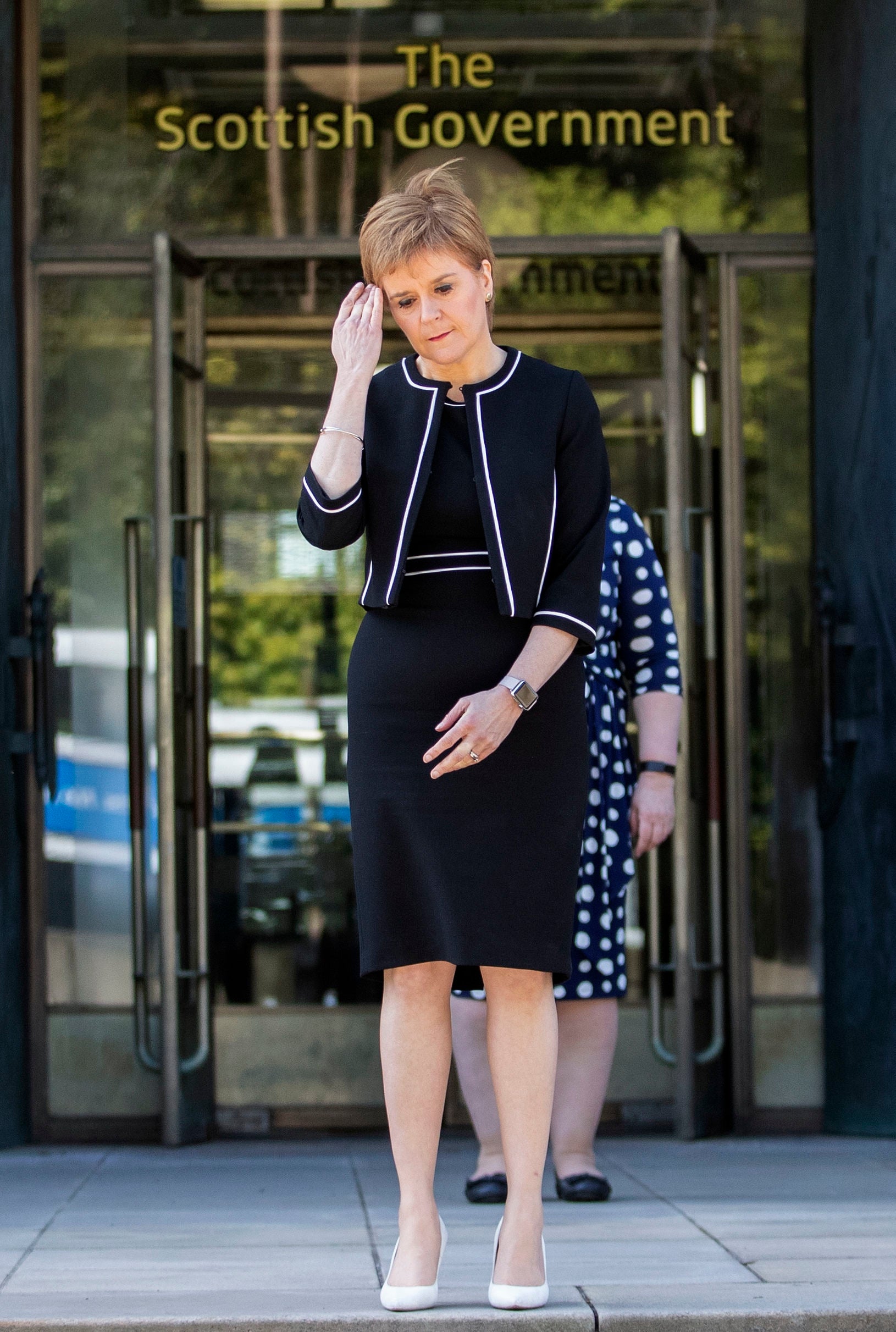
25/30
First Minister Nicola Sturgeon stands outside St Andrew’s House in Edinburgh to observe a minute’s silence in tribute to the NHS staff and key workers who have died during the coronavirus outbreak
PA
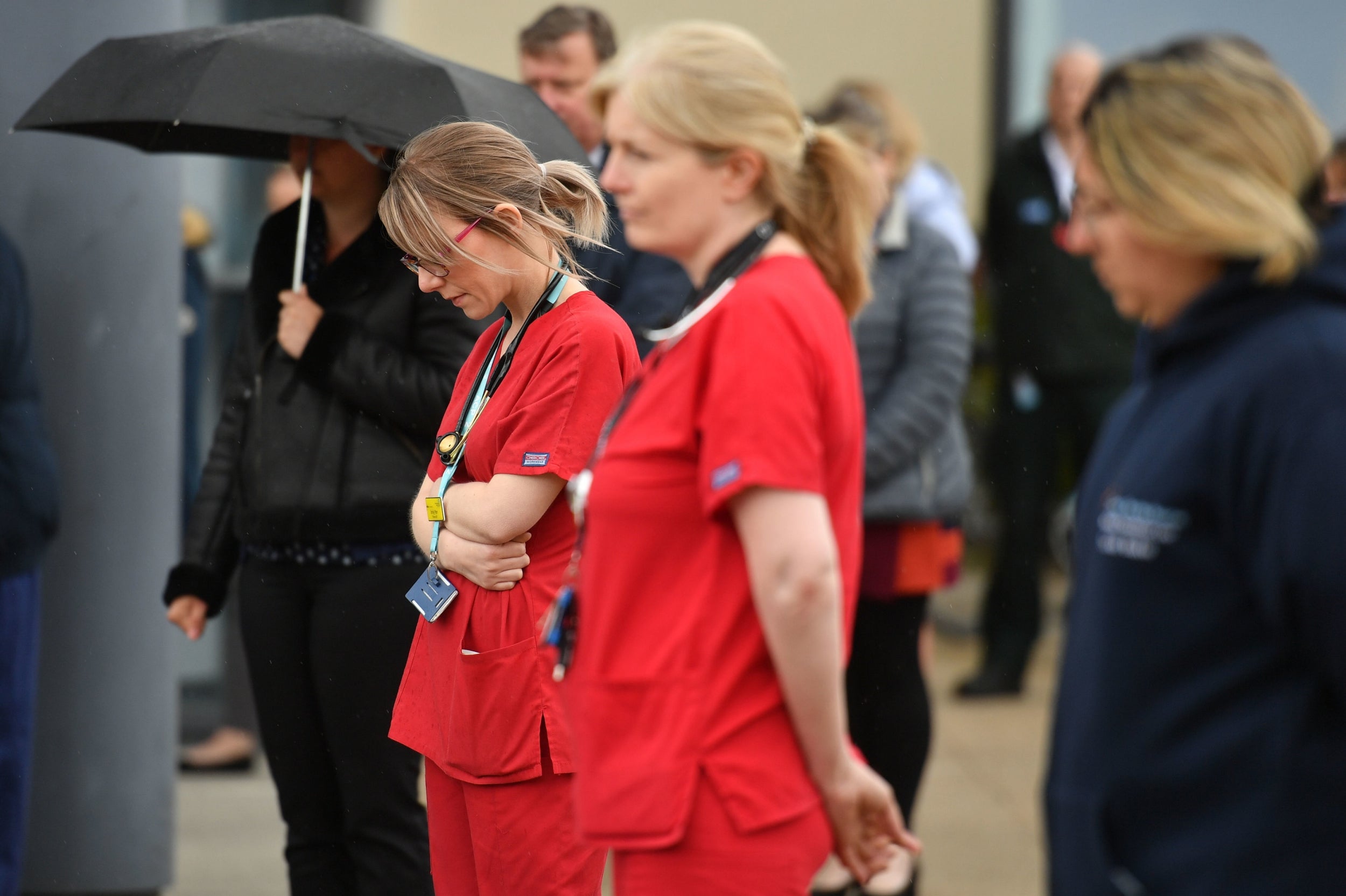
26/30
Staff stand outside the Royal Derby Hospital, during a minutes silence
PA
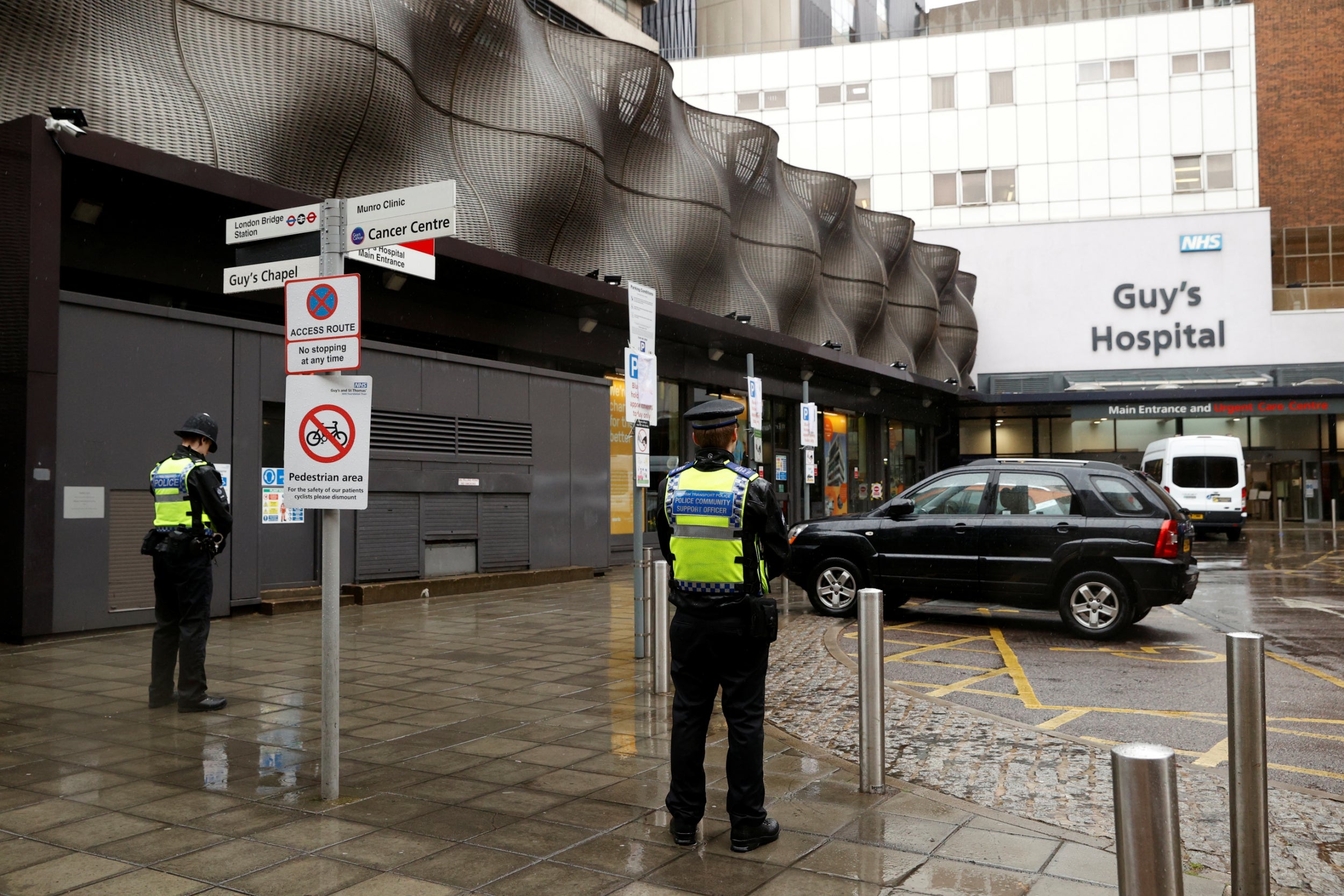
27/30 London
Police officers observe a minutes silence at Guy’s Hospital
Reuters
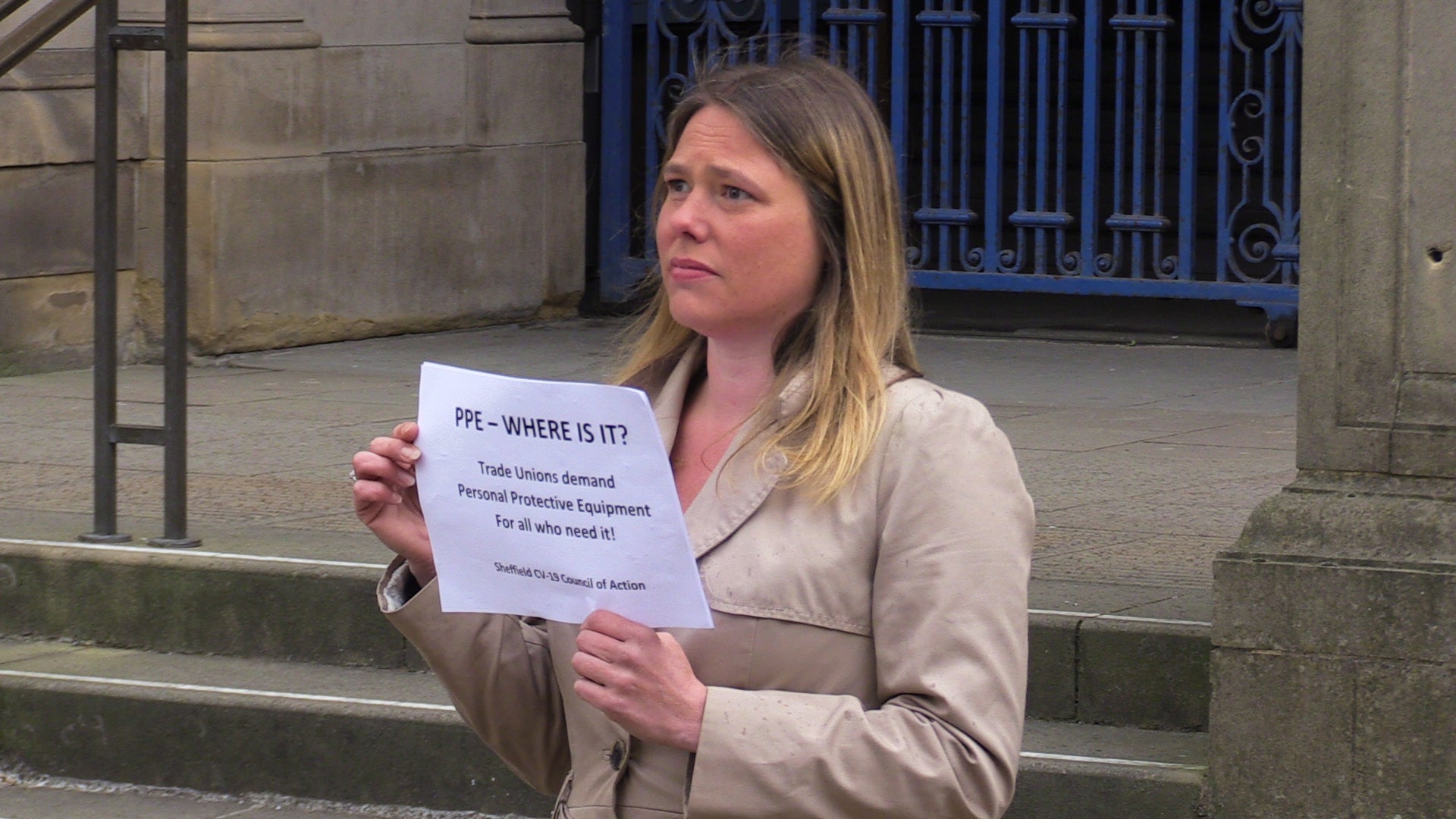
28/30
A woman standing outside Sheffield town hall
PA
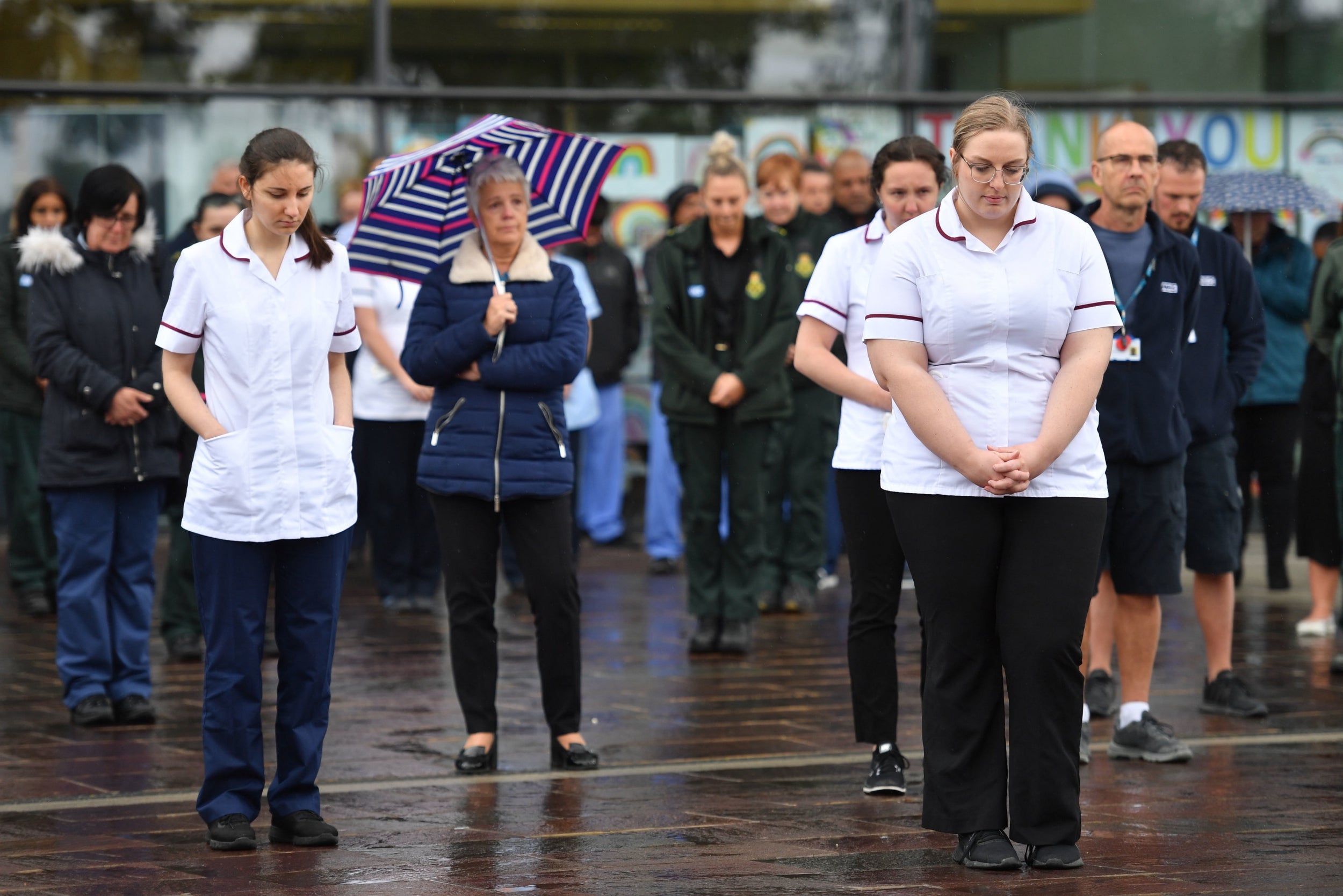
29/30 Royal Derby Hospital
PA
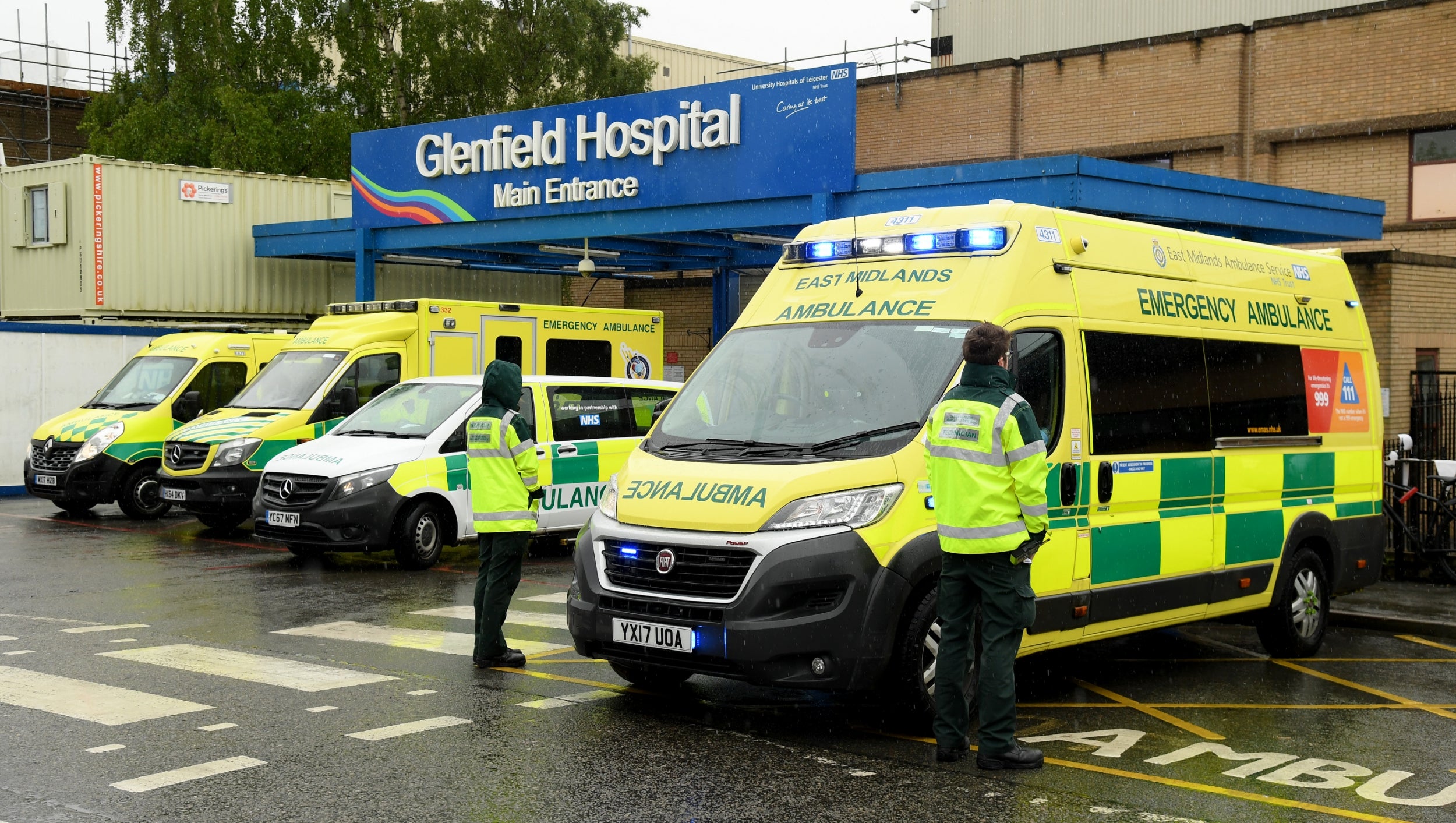
30/30 Leicester,
NHS workers during a minute’s silence outside Glenfield Hospital
Getty

1/30
Staff react outside Salford Royal Hospital in Manchester during a minute’s silence to pay tribute to the NHS staff and key workers who have died during the coronavirus outbreak
PA

2/30
Staff inside Camberwell bus depot in London, during a minute’s silence
PA

3/30
NHS staff at the Mater hospital in Belfast, during a minute’s silence to pay tribute to the NHS staff and key workers who have died during the coronavirus outbreak.
PA

4/30
Shoppers observe a minute’s silence in Tescos in Shoreham
Getty

5/30
Firefighters outside Godstone fire station
PA

6/30 Salford Royal Hospital
Getty

7/30 Salford Royal Hospital
PA

8/30
Hospital workers take part in a protest calling on the British government to provide PPE across Britain for all workers in care, the NHS and other vital public services after a nationwide minute’s silence at University College Hospital in London
AP

9/30
A school children’s poster hanging outside Glenfield Hospital during a minute’s silence
Getty

10/30
A man holds a placard that reads “People’s health before profit” outside St Thomas hospital
Getty

11/30
Staff members applaud outside the Royal Derby Hospital, following a minute’s silence
PA

12/30
Cabinet Secretary Mark Sedwill, Prime minister Boris Johnson and Chancellor of the Exchequer Rishi Sunak, stand inside 10 Downing Street, London, to observe a minutes silence in tribute to the NHS staff and key workers who have died during the coronavirus outbreak
PA

13/30 University College Hospital, London
Hospital workers hold placards with the names of their colleagues who have died from coronavirus as they take part in a protest calling on the British government to provide PPE
AP

14/30
Staff at Waterloo Station in London, stand to observe a minute’s silence, to pay tribute to NHS and key workers who have died with coronavirus
AP

15/30
Medical staff at the Louisa Jordan hospital stand during a UK wide minutes silence to commemorate the key workers who have died with coronavirus in Glasgow
Getty

16/30 London
An NHS worker observes a minute’s silence at Chelsea and Westminster Hospital
Reuters

17/30 Chelsea and Westminster Hospital in London
AFP via Getty

18/30 Belfast, Northern Ireland
NHS staff observe a minutes silence at Mater Infirmorum Hospital
Reuters

19/30 Plymouth
NHS workers hold a minute’s silence outside the main entrance of Derriford Hospital
Getty

20/30
NHS Frimley Park Hospital staff at the A&E department observe a minute’s silence
Getty

21/30 Mater Infirmorum Hospital
People applaud after a minutes silence in honour of key workers
Reuters

22/30 Waterloo Station, London
AP

23/30
Wreaths laid outside Sheffield town hall
PA

24/30
A group of trade unionists and supporters standing outside Sheffield town hall
PA

25/30
First Minister Nicola Sturgeon stands outside St Andrew’s House in Edinburgh to observe a minute’s silence in tribute to the NHS staff and key workers who have died during the coronavirus outbreak
PA

26/30
Staff stand outside the Royal Derby Hospital, during a minutes silence
PA

27/30 London
Police officers observe a minutes silence at Guy’s Hospital
Reuters

28/30
A woman standing outside Sheffield town hall
PA

29/30 Royal Derby Hospital
PA

30/30 Leicester,
NHS workers during a minute’s silence outside Glenfield Hospital
Getty
And the chief executive of Blood Cancer UK, Gemma Peters, warned that the blanket lifting of shielding will add to anxieties for many vulnerable people.
“This announcement does not give people greater freedom, as the shielding guidelines have only ever been optional,” said Ms Peters. “Instead, it risks taking away people’s freedom not to go to work or to the supermarket if they do not feel it’s safe to do so. The government needs to think again and continue to support those most vulnerable to becoming seriously ill from the coronavirus, or we could see people being forced to choose between their financial security and their health.”
Nick Moberly, chief executive of the MS Society, said that people who have been shielding are “desperate to get back to normal life”. But he said he was “gravely concerned” that key support measures such as food packages and statutory sick pay might be taken away prematurely.
“Without this help, and with many people still terrified of infection, for some the idea of normal life returning will feel more like a threat than an opportunity,” he warned.
The latest news on Brexit, politics and beyond direct to your inbox
“The government must keep support in place for as long as possible so people can transition towards normal life safely. Additionally, those who now may have no choice but to return to work must be given the right information so that – together with their employer – they can ensure their working environment is safe.”
More than 3 million free boxes of essential food and 1 million free medicine packs have been delivered to people stuck in their homes, while more than 500,000 NHS volunteers have provided help including telephone calls to support individuals at risk of loneliness as a result of self-isolation.
Enhanced support will remain available from NHS volunteers and local councils, and individuals will retain priority for supermarket delivery slots and continue to be offered help with shopping, medication, phone calls and transport to medical appointments.
And new guidance will be issued encouraging anyone concerned that their workplace may not be Covid-secure to speak with their employer to agree a plan for returning to work and adjustments that may be needed before they go back.
Mr Hancock said that the changes were possible because the rates of infection have fallen to an average of less than 1 person out of 1,700 with the virus outside hospitals, compared with 1 in 500 four weeks ago.
He said: “I know this has been incredibly tough.
“Shielding has involved not leaving your house for months, not seeing people you care about, not being able to wander to the park for some fresh air, or even pop to the shops for something you need. This sacrifice has been for a purpose, and I want to thank every single one of you.
“We knew it was a difficult ask, but these measures have been vital in saving lives. Now, with infection rates continuing to fall in our communities, our medical experts have advised that we can now ease some of these measures, while keeping people safe.”
The deputy chief medical officer, Jenny Harries, said that shielding has had an impact on the mental health of many of those affected.
“The prevalence of the virus in the community is now lower and chances of getting infected are reduced, so we believe it is the right time to relax some of the advice so people can start to regain a degree of normality once more in their daily lives,” she said.
“People should continue to follow social distancing guidance when outside their homes, as well as frequently washing their hands, to minimise the risk of becoming infected. We will continue to monitor the evidence closely and adjust the advice accordingly if there are any changes in the rates of infection that could impact on this group.”
Speaking at the daily Downing Street press conference, Dr Harries warned that Britons should not regard the increasing relaxation of lockdown as an indication that life can go back to how it was before the pandemic.
“There is a critical point here that says just because life is feeling a bit more back to normal don’t suddenly jump to where you were this time last year,” she said. ”We need to learn to go forward with restrictions in our lives.”
Caroline Abrahams, charity director at Age UK, said: “The fact there’s now a roadmap out of lockdown for those who are shielding will be manna from heaven for many older people who we know were worried they were being forgotten as the nation starts to get back to some kind of normal life.
“The changes announced for July are modest and, while a welcome easing of the existing rules, will still require grandparents to choose which family with which to form a support bubble, unless they only have one child – not at all easy for many I’m sure.”
The government will now write to all individuals on the Shielded Patient List with updated information on shielding advice and the ongoing support that will be available to them.



